 11864
11864
Introduction
Chapter I Situation with ensuring and observing the human and civil rights and freedoms in Turkmenistan
Chapter II Civil and political rights
Chapter III Economic, social and cultural rights
Chapter IV Review of handling citizens’ appeals
Chapter V Work of the Ombudsman to assist improving the national legislation of Turkmenistan
Chapter VI Participation of the Ombudsman in public events. Assistance in raising awareness in the field of human rights
Chapter VII International cooperation
Chapter VIII Inquiries and recommendations of the Ombudsman
Chapter IX Conclusion
Introduction
The enshrinement in Article 4 of the Basic Law of Turkmenistan - the Constitution, legislative norms that “In Turkmenistan, the people shall be the highest value of the society and the State. Protection, support and service to people shall be the main goals of State authorities. The State shall be responsible for every citizen and shall create conditions for free development of an individual, protect the life, honour, dignity and freedom, personal inviolability, natural and inalienable rights of a citizen” is the main principle of the work of the Ombudsman - the Authorized Representative for Human Rights in Turkmenistan.
This Report shall focus on the activities of the Ombudsman carried out in accordance with the specified tasks in 2024, which passed under the motto “The Fount of Wisdom of Magtymguly Fragi”, and the situation in the field of human rights in the country.
The report reviews the conditions created to ensure human and civil rights and freedoms in Turkmenistan, ensuring civil, political, economic, social and cultural human rights; actions taken in response to citizen appeals; shortcomings and violations of legislation identified during inspections. It also describes the Ombudsman’s activities to improve national legislation, develop international relations and raise awareness of human rights in the country.
In accordance with the requirements of Article 20 of the Law of Turkmenistan “On the Ombudsman”, this Report shall be submitted for consideration to the esteemed President of Turkmenistan. The Ombudsman will present this Report to the Mejlis of Turkmenistan.
The media, the website of the Ombudsman’s Office will promulgate the Report and will make it available to the public.
Chapter I. Situation with ensuring and observing the human and civil rights and freedoms in Turkmenistan
In 2024, called the “The Fount of Wisdom of Magtymguly Fragi”, the favourable conditions created by the state for the peaceful life of a person and citizen in the country were significantly raised. The successful implementation of the country’s socio-economic strategy through achieving balanced development of all sectors of the economy was aimed, primarily, at increasing the well-being of people and improving social protection of the population.
The national programmes, concepts and policies to create all the necessary conditions for a prosperous and happy life of the people defined the relevant tasks; and in 2024, their successful implementation continued. The reforms in various sectors carried out during the period covered by the Report had an impact on the protection of human and civil rights, the financial, economic and everyday life, science and education, health care and other spheres. The approval in the period covered by the Report of such acts aimed at:
— ensuring and implementing human rights - the Decree of the President of Turkmenistan “On increasing the amount of wages, pensions, state benefits, scholarships for students and listeners in Turkmenistan”,
— improving the well-being of farmers, their decent life, improving their living conditions through resolutions of the President of Turkmenistan: “On increasing state procurement prices for wheat and cotton and economic incentives for agricultural producers”, “On increasing state procurement prices for rice”, “On issues of regulating land relations in Turkmenistan”,
— ensuring constitutional guarantees of equality of foreign citizens and stateless persons residing in Turkmenistan with citizens of Turkmenistan - the Decree of the President of Turkmenistan “On Admission to citizenship of Turkmenistan”, the Resolution of the President of Turkmenistan “On issuing a residence permit in Turkmenistan”,
— ensuring the right of the population to health protection: “The National Programme for the Development of Physiological Science in Turkmenistan for 2024-2028”, “The National Strategy for Medical Health and Rehabilitation Activities in Turkmenistan for 2024-2028”, “The National Immunoprophylaxis Programme of Turkmenistan for 2024-2028”, along with “The Concept for improving the teaching methods for general education curricula in Turkmenistan until 2028”, “The State Programme for the Comprehensive Development of Biotechnology in Turkmenistan for 2024-2028”, “The Programme for the Socio-Economic Development and Investments of Turkmenistan for 2024”, “The Strategy for the Development of Science in Turkmenistan for 2024-2052”, “The Concept for the Development of the City of Arkadag for 2024-2052” and other acts have served as an example of this.
All these acts, approved by decrees and resolutions of the President of Turkmenistan, were aimed at the comprehensive implementation of human and civil rights guaranteed by the Constitution of Turkmenistan. In this regard, the adoption of the Decree of the President of Turkmenistan “On the Admission to Citizenship of Turkmenistan” on 20 September 2024, on the eve of Turkmenistan’s Independence Day deserves special attention. In accordance with this regulation of the President of Turkmenistan and the acceptance of 1,146 stateless persons residing in Turkmenistan into citizenship of Turkmenistan, our country has created the opportunity to end statelessness and be recognized as a worthy example for other countries in the region at the Regional Ministerial meeting held in November 2024 in the capital of Turkmenistan.
As a result of the continuous development of the national economy, conditions have been created for further improvement of the well-being of our population. The main evidence of this was the 10% indexation in 2024 of wages, pensions and state benefits, scholarships for students and listeners, employees of institutions financed from the State budget, business economic enterprises and public associations in accordance with the Decree of the President of Turkmenistan of 14 July 2023. By this Decree, the minimum pension for participants in the Great Patriotic War, their spouses and home front workers was increased to 2070 and 605 manats respectively, which confirmed the manifestation of concern for improving the well-being of gray-haired grandfathers and grandmothers.
The development of innovative production in the country, large-scale works in the construction and industrial complex were carried out to provide the people with a comfortable and prosperous life. Examples of this are the commissioning of the high-speed Tejen-Mary highway implemented within the framework of the construction of highways of national importance, the highway bridge across the Garabogazgol Bay, the construction of which is underway, the commissioning of drinking water treatment facilities in the Bagtyyarlyk district of Ashgabat and the Yashlyk village of the Ak bugday district, Ahal region. As a result of the social policy, concern for the well-being of the people has become a priority of state policy; from year to year stable rates of development are reported in all regions of the country, high-quality amenities are created for our people. The period under review marked the anniversary of the grand opening of the “smart” city Arkadag, built for the first time in the country’s history on the initiative of the National Leader of the Turkmen people. In this regard, at the International Exhibition held in the Republic of Korea, the city of Arkadag received the main prize as the most distinguished “smart” city. The facilities created in this city ensure the right of people to decent housing, education, health care, a clean environment and other rights. During the period under review, in order to improve the living conditions of the population, 767.8 thousand m2 of housing were commissioned and transferred to citizens for their residence. The construction and putting into operation of 10 industrial complex facilities, 4 agro-industrial complex facilities and more than 15 socio-cultural complex facilities last year created the opportunity to provide additional jobs for our citizens.
The issue of supporting the private sector in the country, that is, small and medium-sized businesses, is always in the spotlight. Members of the Union of Industrialists and Entrepreneurs of Turkmenistan have achieved satisfactory results in a short period, doing business in various sectors of the economy. In the year under review, the share of private businesses in the construction of facilities has approximately achieved 87.84 %, which shows that the role of small and medium businesses in the economic life of the country is increasing every year. An increase in the share of the private sector in the economy not only helps ensure the human right to work, but also leads to an improvement in the social and cultural conditions of human life based on an increase in the political and economic power of the country.
The country successfully implements youth development, constitutional rights to healthy living conditions and education. In the period under review, based on the importance of raising a broad-minded, literate young generation, strengthening patriotic and moral feelings among young people, new buildings of general education, secondary and higher educational institutions were built and commissioned that meet international standards. Educational institutions entered a new stage of cooperation with international organizations. Given the importance of increasing the knowledge of young people on cultural values and traditions of their country, and the full development of creative and research activities, after the signing at a meeting of the UNESCO National Committee in February 2023 of agreements on the opening of the UNESCO departments - a specialized UN institution on education, science and culture - departments were opened at the Turkmen State University named after Magtymguly and the Turkmen State Pedagogical Institute named after Seyitnazar Seydi. In January last year, several secondary schools of Turkmenistan entered the network of associated UNESCO schools. Following the work in this direction, it is planned to connect other schools in the country, namely the schools of the city of Arkadag to this network.
During the reported year, the work carried out to ensure the rights of citizens to protect health was at the focus of the State. This was evidenced by the prevention, diagnosis and treatment of diseases, the introduction of new progressive methods, practices and technologies into the healthcare system, continuous training of medical workers, equipping healthcare institutions with new state-of-the-art equipment, building and putting into operation new health facilities. In the observed period, the new health facilities were opened and commissioned:
modern buildings of the Regional and City Sanitary and Epidemiological Service;
the service buildings of the Maternal and Child Health Center of Mary region;
Glycyrrhizin acid production facility in Turkmenabat, Lebap region;
the buildings of the International Health and Rehabilitation Centre for 400 beds, and
International Scientific and Clinical Centre of Physiology for 250 beds in Ashgabat.
As a result of fostering a healthy lifestyle in society, educating a healthy generation, developing physical culture and sports in the country, turning the country into the hub for large international and regional competitions, in the observed period, the capital, by the decision of the Council of the CIS Heads of government, was awarded the title of the “City of new sports capabilities for the Commonwealth”; and the tennis complex of the Olympic town was recognized by the Asian Tennis Federation as the “Training Tennis Centre for Asian region”.
The development of equal and mutually beneficial relations with the countries of the world is one of the main areas of the country’s foreign policy. Based on permanent neutrality recognized by the United Nations in 1995 and 2015 and enshrined in its Constitution, Turkmenistan develops and strengthens relations with all countries and authoritative international organizations. The permanent neutrality of Turkmenistan is a model for the whole world, and forward-looking, peaceful, friendly and philosophical initiatives are confirmation to it. The establishment of the Strategic Advisory Council “Turkmenistan - UN” was a testament to it. In addition, the initiatives of Turkmenistan, who puts forward proposals to strengthen peace, unity and stability on the planet during the year called “The Fount of Wisdom of Magtymguly Fragi”, were supported by the UN General Assembly and formed the basis for about 30 resolutions of this international organization. During the period under review the resolutions on the “Central Asia is a zone of Peace, Trust and Cooperation”, and the “UN Games”, adopted at meetings of the UNGA ensued from Turkmenistan initiatives, indicated that the international authority of Turkmenistan was growing, and its initiatives and proposals were upheld by UN Member States.
Special attention should be paid to proclaiming the year 2025 “The Year of International Peace and Trust” at the 68th plenary meeting of the UNGA 78th session upon Turkmenistan’s initiative. This once again shows that Turkmenistan puts the observance of human rights and the protection of the peace at the focus of its domestic and foreign policy; even more so, according to the world famous peace fighter Nelson Mandela, “Peace is not just the absence of conflict; it is the ability to handle conflict by peaceful means. It is the protection of a fundamental human right, the right to dignity and a decent life”.
Developing cooperation in various areas with the countries of the region and the world, expanding multilateral and diversified relations, achievements and opportunities of diplomacy are effectively used to strengthen the international authority of the state.
Pursuant to the Decree of the President of Turkmenistan “On the celebration of the 300th anniversary of the birth of the great thinker and the poet-classic of the East Magtymguly Fragi”, in the past year called “The Fount of Wisdom of Magtymguly Fragi”, our country and foreign countries carried out a large-scale activities on the study and wide promotion of the rich literary heritage of the famous master of the word that became a part of the spiritual culture treasury of mankind and underpinned the national school of education of high morality, humanism and patriotism.
Proclaiming at a meeting of the Permanent Council of the International Organization of Turkic Culture (TURKSOY) 2024 “The year of the great poet and thinker of the Turkic world Magtymguly Fragi”, and the ancient city of Anau “The cultural capital of the Turkic world”, the inclusion of Magtymguly manuscripts in the international list of the UNESCO programme “The Truth of the World”; the 300th birth anniversary of the great master of the word in the lists of solemn events, which would be celebrated in 2024-2025 together with UNESCO; and the holding of the International Forum “Eras and Civilizations nexus is the basis of Peace and Development” and a Conference of Ministers of Culture “The Fount of Wisdom of Magtymguly Fragi” prove that the work of our exemplary poet is recognized globally, and Turkmenistan is the state promoting global humanitarian initiatives.
In the past observed year, the work of the Ombudsman was carried out in accordance with the powers, rights and obligations defined by the Law of Turkmenistan “On Ombudsman”; in line with information about the level of exercise and observance of human rights and freedoms in the country received on demand and appeals, as well as with agreements on cooperation with international organizations concluded by the Ombudsman, a Strategic Plan of the Ombudsman’s Office for 2024-2028 and the Work Plan for 2024.
The work of the Ombudsman to assist and protect human rights was discussed in the framework of established special government commissions. Namely, participating in three meetings of the Interagency Commission to ensure the fulfillment of the international obligations of Turkmenistan in the field of human rights and international humanitarian law, the Ombudsman expressed her opinion on human rights and international humanitarian rights of international significance. At these meetings, the issues of strengthening the Ombudsman’s Office and improving its legal foundations were discussed.
The Ombudsman participated in three meetings of the Interagency Commission on Combating Trafficking in Human Beings, formed by the Decree of the President of Turkmenistan No. 959 of 2 May 2024, conducted during the year. The Ombudsman expressed an independent opinion on the issues under discussion and documents in the field of combating human trafficking. It should be noted that within the work of this Commission, drafts of important documents were developed. In particular, in order to improve the provisions of the Law of Turkmenistan “On Combating Trafficking in Human Beings”, the “National Action Plan to Combat the Trafficking in Human Beings for 2025-2029”, along with a draft law were developed. The creation of this Commission and the preparation of important documents within its framework confirm that the country is conducting systematic and effective work to protect citizens from various global threats.
As part of the Ombudsman cooperation with international organizations, seminars, workshops, consultations, “round tables” dedicated to various areas of human rights were held. They are described in detail in Chapter VII of the Report.
The successes achieved in the work carried out in connection with the accreditation of the Office of the Ombudsman in the Global Alliance of National Human Rights Institutions (GANHRI) should be specifically noted. This association is the coordinating body of national human rights institutions (NHRIs) and the universal body contributing to the observance of NHRIs that protect and promote human rights, the principles of legal status, in other words, Paris principles. For accreditation in this Alliance, the Ombudsman in cooperation with the Office of the UN High Commissioner for Human Rights (UNHCHR), the UN Development Programme (UNDP), the Asia-Pacific Forum (APF) held relevant events. On 16 October 2024, through a video conference, the Ombudsman conducted a dialogue with the GANHRI SCA (Sub-Committee for Accreditation). Following the results of the work done, the Ombudsman’s Office in Turkmenistan was assigned the “B” status. The assignment of this legal status has become the outcome of the activity of the Ombudsman’s Office in the protection of human rights in the country and confirmed the international recognition that its activities in this area comply with international standards. The work of the Office of the Ombudsman in the protection of human rights, which increases its responsibility in protecting human rights and freedoms, rendered yet another step towards entering the respective world platform of work.
In 2024, one of the events that influenced the institutional capabilities of the Ombudsman’s Office was the formation of new units and an increase in the number of employees of the Ombudsman’s Office by virtue of the Decree of the President of Turkmenistan of 14 June 2024. Based on the Decree of the President of Turkmenistan “On improving the work of the Ombudsman’s Office” a new structure of the Office was approved. In accordance with it, the Office comprises three units, namely, on the protection of human rights in state authorities and local self-government, on the protection of women and children’s rights and on the protection of human rights in the private sector. This created an opportunity to ensure the protection of human rights and freedoms not only in relations with State authorities, but also in relations with the private sector. A Law was established improving the work of the Ombudsman and changes in its structure. Namely, relevant amendments and additions were introduced on 24 November 2024 in the adopted Law of Turkmenistan “On Amendments and Additions to some Legislative Acts” by the Mejlis of Turkmenistan to the Law of Turkmenistan “On the Ombudsman”.
In accordance with the amendments and additions made to the Law of Turkmenistan “On the Ombudsman”, state safeguards for the protection of the human and civil rights and freedoms are provided, ensuring the observance and respect of these safeguards by state authorities, local authorities and their officials, enterprises, institutions and organizations, regardless of the form of ownership and other individuals. The Ombudsman, when monitoring the observance of human rights, finding a violation of rights and freedoms, appeals with the proposal of a recommendatory nature to authorized bodies, to officials or other authorized persons. Complementing the law with the provision on the possibility of making a proposal for the prevention of circumstances that may lead to a violation of the human and civil rights and freedoms significantly empowered the Ombudsman. This will increase the possibilities of the Ombudsman in facilitating the prevention of human rights violations in the country.
Concurrently, the study of acts of State authorities and local self-governments, including enterprises, institutions and organizations, regardless of the form of ownership affecting human rights and freedoms, as well as appeals filed in the Office of the Ombudsman on this issue, created the opportunity to evaluate and study the degree of ensuring and observing human rights and freedoms. All oral and written appeals received in the Ombudsman’s Office during the year under review were considered in accordance with the Law of Turkmenistan “On the Ombudsman” and relevant decisions were made on them.
The issues of ensuring the civil and political, economic, social and cultural human, civil rights, and freedoms in the country, and activities carried out in connection with appeals to the Ombudsman, are covered in detail in the corresponding Chapter of the Report.
Chapter II. Civil and political rights
According to the provisions set out in the initial Articles of section II of the Constitution of Turkmenistan, devoted to the human and civil rights, freedoms and duties, the human and civil rights and freedoms in Turkmenistan shall be recognized in accordance with the universally recognized norms of international law and guaranteed by the Constitution and laws. The rights and freedoms of an individual shall be inviolable and inalienable.
Obligations in the field of human rights and freedoms originate from the Universal Declaration of Human Rights, adopted by the United Nations in 1948, as a universally recognized norm of international law. By joining a number of international human rights agreements during the period of independence, Turkmenistan assumed the obligations arising from them. In particular, the country’s accession to the International Covenant on Civil and Political Rights, which is one of the fundamental documents of the United Nations, demonstrates respect for human rights and freedoms in this area.
Part of the human rights that is assessed in this chapter of the Ombudsman’s Report comes from the UN International Covenant on Civil and Political Rights, to which Turkmenistan acceded in December 1996. In accordance with this international document, our State recognizes the right to life, freedom from slavery, forced or compulsory labour, the right to privacy, the right to humane treatment of prisoners, the right to respect for their individual dignity, the right to leave and return to the country, the right to freedom of movement and choice of place of residence or place of sojourn, the right to equality before the courts, the right to inviolability of the home, freedom of thought, belief, religion, peaceful assembly, must respect the right to form associations, the right to freedom to marry, protection of children’s rights, the right to govern society and the State, the right to elect and be elected, protection from discrimination, the rights of ethnic, religious and linguistic minorities to use their culture and native language, practice their religion and their traditions. In this regard, the State guarantees of these and other rights are enshrined in the Constitution and legislative acts of Turkmenistan. To wit, in the Criminal Code of Turkmenistan, the Criminal Procedure, Penal Enforcement, Civil Procedure, Electoral Codes, the Laws of Turkmenistan “On Citizenship of Turkmenistan”, “On the Legal status of military personnel”, “On Combating trafficking in human beings”, “On Public Associations”, “On State Youth Policy”, “On the Organization and holding of meetings, rallies, demonstrations and other mass events”, “On Refugees”, “On the Legal status of foreign citizens in Turkmenistan” and other laws of Turkmenistan provide for norms on civil and political human rights., specified in international documents. The national legal system is constantly being improved due to the changing requirements of the times, the emergence of new relations, the introduction of amendments to international documents reflecting the challenging situation in the world, the adoption of optional documents, and the political and economic development of the country. In 2024, work continued on improving national legislation on civil and political human rights. Relevant amendments and changes have been made to the Civil Procedure Code of Turkmenistan, along with the laws of Turkmenistan “On advocacy and advocate activity”, “On acts of civil status”, “On Civil Service”, “On the Ombudsman”, “On International Treaties of Turkmenistan”.
The adopted and improved normative legal acts form the legal framework for the observance of civil and political human rights in the political life of the State and in public relations. The tasks arising from the national legal framework are outlined in state national programmes, plans and concepts, and the directions, areas and deadlines for their systematic implementation are determined. In connection with civil and political human rights, the task of eliminating statelessness in the country has become the focus of attention. The National Action Plan for 2019-2024 for the eradication of statelessness in Turkmenistan has identified specific objectives. These objectives have been effectively implemented in our country. In September 2024, by Decree of the President of Turkmenistan, 1,146 people received the citizenship of Turkmenistan. At the Regional Ministerial meeting held in Ashgabat on 9 November 2024, it was noted that to date, 32,144 stateless persons living in the country had received citizenship of Turkmenistan, 5,152 foreign citizens and stateless persons had received a residence permit in Turkmenistan. At this meeting, Turkmenistan was recognized as the State that put an end to statelessness. This is proof of the commitment of the State to its obligations assumed by joining international instruments. In connection with such specific results of this activity, during the period under review, the Office of the Ombudsman received no complaints related to citizenship issues.
According to Article 25 of the International Covenant on Civil and Political Rights, the right of citizens to take part in the conduct of public affairs, directly or through freely chosen representatives, to vote and to be elected is defined as one of the basic political human rights. These provisions of the Covenant are enshrined in the Basic Law of the State as constitutional guarantees of Turkmenistan. The possibility of practical realization of this right in 2024 arose in connection with the election of new members to the Mejlis (Parliament) instead of MPs whose terms of office expired ahead of schedule. In this situation, the staff of the Ombudsman’s Office, as representatives of an independent body, monitored the organization and conduct of elections on a democratic basis. No violations of the law were identified during the elections. There were no complaints about human rights violations during the elections.
In accordance with the powers defined in the Law of Turkmenistan “On the Ombudsman” and in order to fulfill the tasks stipulated in the Work Plan of the Ombudsman’s Office for 2024, regular monitoring of the observance of the rights of prisoners in correctional institutions of the country was carried out. The Ombudsman conducted inspections of the observance of the rights of persons detained in some institutions, in particular, persons deprived of liberty held in correctional institutions DZ-E/8 and MR-E/16.
The inspections examined compliance with sanitary standards, medical care, nutrition and other material and household support, working conditions, cultural recreation, sports conditions, freedom of religion, short- and long-term visits with close relatives, the right to file a complaint, and checked their compliance with the requirements of current legislation. During the inspection, the Ombudsman conducted interviews with persons held in these correctional institutions.
During the inspection of the correctional colony DZ-E/8, it was found that the number of employees in the colony thereto did not meet the staffing requirements; in particular, some medical positions required for the correctional colony for women were vacant.
In addition, it was established that the document management of the correctional institution was not carried out in accordance with the Instructions on the procedure for organizing the consideration and reception of appeals from individuals and legal entities in the internal affairs bodies of Turkmenistan, approved by Order of the Minister of Internal Affairs of Turkmenistan No. 168, adopted in August 2018. In addition, it was established that the requirements of the legislation were violated when registering appeals from individuals and legal entities in the registration book.
As a result of the audit, a proposal was sent to the Ministry of Internal Affairs of Turkmenistan in accordance with Article 30 of the Law of Turkmenistan “On the Ombudsman” to eliminate the shortcomings identified during the audit. The Ministry of Internal Affairs of Turkmenistan reviewed the Ombudsman’s proposal and informed about the necessary measures to eliminate the shortcomings.
During the inspection conducted at the correctional institution MR-E/16, it was found that the number of convicts held in the institution exceeded the established norm. Despite the creation of the necessary conditions for voluntary work for persons serving sentences in the institution, it has been established that there were shortcomings in proper observance of occupational safety and health, technical safety and industrial sanitation, provision of personal protective equipment and hygiene, and the creation of conditions for cultural leisure. In order to correct the identified deficiencies, in accordance with Article 30 of the Law of Turkmenistan “On the Ombudsman”, a relevant proposal was sent to the Ministry of Internal Affairs of Turkmenistan. In addition, in order to ensure security in the correctional facility and prevent the transfer of various malicious items, it was proposed to install special scanning devices at the places of inspection of parcels, banderols and transferred items intended for prisoners.
Upon consideration of this proposal, the Ministry of the Interior informed about the measures taken to organize the work of correctional institutions in accordance with the requirements of the legislation of Turkmenistan and to eliminate violations of the legislation specified in the proposal, as well as the necessary measures for the construction of new buildings for correctional institution MR-E/16.
According to Article 40 of the Constitution of Turkmenistan, the family, motherhood, fatherhood and childhood shall be under the protection of the State, while the preservation of family well-being and the strength of family relations is at the centre of the State’s attention. In this regard, it is important for the staff of the Ombudsman’s Office to participate in the development of draft laws in the Mejlis of Turkmenistan on amendments and additions to the Family Code of Turkmenistan and the Code of Civil Procedure of Turkmenistan, where employees submitted their comments and suggestions. With the adoption of laws on amendments and additions to these legislative acts, norms were added to the Codes aimed at preserving family unity, promoting mutual reconciliation of the parties, and the possibility of restoring family well-being when considering family matters. It is also aimed at preserving family integrity by increasing the period for reconciliation to nine months; and the inclusion of rules on extending the period of reconciliation to nine months when considering civil cases of divorce was aimed at preserving family harmony.
In the year under review, 164 written and 76 oral appeals related to violations of civil and political rights of citizens were submitted to the Office of the Ombudsman. Of these, 8 written appeals were satisfied. Civil and political rights were mainly related to complaints about the actions of law enforcement officials, migration, registration issues, complaints about court decisions and their execution, and complaints about criminal cases and criminal acts, which is described in detail in chapter IV of the Report. When considering appeals on civil and political human rights, the Ombudsman carried out relevant work with the Supreme Court of Turkmenistan, the Ministry of Internal Affairs of Turkmenistan, the Prosecutor General’s Office of Turkmenistan, and the State Migration Service of Turkmenistan, the hyakimliks/municipalities of the city of Ashgabat and some velayats/regions.
Thus, as a result of the analysis of ensuring the political and civil rights of people in the country and the activities of the Ombudsman in this area, in order to promote the realization of these rights, the following is proposed:
— Implementation of the Ombudsman’s recommendations to the Ministry of Internal Affairs of Turkmenistan, including bringing the conditions of detention of prisoners in the buildings of correctional institutions constructed long time ago in line with the requirements of the law, and the implementation of appropriate actions related to the construction of new buildings.
III. Economic, social and cultural rights
The economic, social and cultural rights defined in our national legislation and universally recognized norms of international law include the human right to social security, housing, education, health care, adequate food, cultural participation, water, a clean environment, and the right to work. Since the reforms carried out in the country during the ‘Revival of a new era of a powerful state’ are aimed at further improving the housing and social conditions of the population, all opportunities are being created to ensure their aforementioned rights.
Activities aimed at further improving the social well-being of our people, further strengthening the economic power of our motherland, and expanding international cooperation, which is the main focus of our country’s domestic and foreign policy, effectively continued last year, which was held under the motto “The Fount of Wisdom of Magtymguly Fragi”. The Programme of Socio-economic Development and Investments in Turkmenistan for 2024 has been successfully implemented. Within the framework of this and other ongoing programmes, significant results have been achieved in ensuring sustainable economic development of the country and improving the standard of living of the population. As a result of the successful implementation of comprehensive measures, stable growth of the GDP was ensured, the growth rate increased by 6.3 %. In industry, this figure was 1.5%, in construction - 11%, in transport and communications - 7.2%, in trade - 10.1%, in agriculture - 5.3%, in services - 8.6%. Compared to the same period in 2023, the number of manufactured products increased by 12.1%, and retail sales increased by 13.1%. The revenue part of the country’s main financial plan has been fulfilled by 105.9%, the expenditure part - by 99.9%. In the reporting year, the revenue part of local budgets was fulfilled by 103.8%, the expenditure part - by 99.8%.
The average wage at large and medium-sized enterprises in the country increased by 10.6% compared to 2023. Wages, pensions, government benefits and scholarships were funded in a timely manner. The capital investment plan, developed from all sources of financing, has been fully implemented, having increased by 9.1% compared to 2023.
National legislation is constantly being improved in order to implement the programmes adopted in our country and ensure the economic, social and cultural rights of people. In particular, in 2024, the laws of Turkmenistan “On Amendments to the Code of Turkmenistan “On Land”, “On Amendments to the Code of Turkmenistan on Social Protection of the Population”, “On Amendments and Additions to the Family Code of Turkmenistan”, “On Amendments to the Code of Civil Procedure of Turkmenistan”, “On Amendments to the Sanitary Code of Turkmenistan”, “On Amendments to the Labour Code of Turkmenistan”, the laws of Turkmenistan “On the State Budget of Turkmenistan for 2025”, “On the Cultural Heritage of Magtymguly Fragi”, “On the establishment of the jubilee medal of Turkmenistan “Magtymguly Pyragynyň 300 ýyllygyna”, “On Energy Conservation and Energy Efficiency”, “On Hydrometeorological Activities”, “On Amendments and Additions to the Law of Turkmenistan “On Currency Regulation and Currency Control in foreign economic relations”, “On Amendments and Additions to the Law of Turkmenistan “On Seed Production”, “On Amendments to the Law of Turkmenistan “On Combatting Doping in Sport”, “On Amendments to the Law of Turkmenistan “On Scientific Organizations”, “On Amendments to the Law of Turkmenistan “On State Scientific and Technical Policy”, “On Amendments and Additions to the Law of Turkmenistan “On Physical Culture and Sports”, “On Amendments and Additions to the Law of Turkmenistan “On Veterinary Medicine”, as well as with the adoption of the laws of Turkmenistan “On Amendments and Additions in some legislative acts of Turkmenistan”, relevant amendments and additions were made to the laws of Turkmenistan “On Civil Service”, “On the Ombudsman”, “On advocacy and advocate activity in Turkmenistan”, “On acts of civil status”, which established norms aimed at ensuring economic, social and cultural human and civil rights.
Within the framework of the programmes adopted in the country, large-scale work is underway on the construction of socially significant facilities that meet international standards. In addition to these documents, the Concept for Development of Arkadag City for 2024-2052, and the Strategy for the Development of Science in Turkmenistan for 2024-2052, were endorsed in 2024.
According to the Constitution of Turkmenistan, every citizen has the right to housing and State support in obtaining or purchasing comfortable living quarters and in building an individual apartment building. Sufficient housing in the country is a prerequisite for the realization of the human right to a decent standard of living in accordance with the Universal Declaration of Human Rights. Under the leadership of the esteemed President of Turkmenistan, new administrative and residential buildings with state-of-the-art equipment are continuously being built and put into operation in our country. During the ‘Revival of a new era of a powerful state’, urban planning policy is being successfully implemented, large investments are being made in the construction of buildings and facilities for various purposes harnessing advanced world techniques. Pursuant to the Programme of Socio-Economic Development and Investments of Turkmenistan for 2024, a number of major projects have been implemented. The construction of the second stage of the Arkadag city, one of the largest projects in the Central Asian region, continued. In order to improve the living conditions of the country’s population, investments were channeled to the construction of social facilities, including housing, healthcare facilities, secondary schools and kindergartens, highways, water, gas and electric pipelines, communication systems and water treatment plants.
Among the socio-economic facilities built and put into operation last year, the following can be cited as examples: a steel pipe and profile production plant, sewage treatment plants in Ahal region, the “Şir Ýag” lubricants plant in Lebap region, a polyester and polypropylene fiber production plant, the Serhetabat-Turgundi railway bridge, the Tejen-Mary section of the Ashgabat-Turkmenabat high-speed highway in Mary region, the Balkan-Dashoguz power transmission system, the Dashoguz power plant in Dashoguz region, the Arkaç Shopping, Entertainment and Business Centre with an underground parking lot, a playground with parking and 8 administrative and commercial buildings on the same street in Ashgabat, the “Arkadagly nesiller” Children’s cultural and entertainment Centre in Magtymguly town, the Magtymguly district, Balkan region.
Large apartment buildings, multi-storey apartment buildings and cottage complexes that are being built in the country are replenishing the country’s housing stock. Due to the construction and commissioning of housing with an area of 767.8 thousand m2 and a cost of 2939.6 million manats, last year it accommodated hundreds of families in Ashgabat, Ahal, Balkan, Dashoguz, Lebap and Mary regions, thus realizing their right to housing. For example, last year 136 two-storey residential buildings were built and commissioned in the Choganly residential area alone. Providing the population with comfortable housing that meets international standards is a clear indicator of the successful implementation of the urban development programme in the country. In honour of International Women’s Day, mothers who have given birth to and raised eight or more children are awarded the honorary title of “Ene mahri” annually by Decree of the President of Turkmenistan, and some mothers with many children have been given the keys to new apartments.
In 2024, the Office of the Ombudsman received 89 appeals on housing issues, of which 59 were written and 30 were oral. Of the submitted written appeals, 1 was satisfied. As a result of the work carried out on citizens’ appeals related to housing issues, they were given satisfactory answers in accordance with the legislation of Turkmenistan, including with the Housing Code, which is described in detail in Chapter IV of the Report.
Everyone has the right to education. Great importance is garnered to the improvement of the country’s education system, the upbringing of an educated, knowledgeable and innovative generation with the understanding of innovative technologies. New, modern educational institutions are being consistently built in Ashgabat, Arkadag and the regions of the country, and special attention is being paid to their staffing with highly qualified personnel. On the Day of Knowledge and Student Youth, students admitted to the first grade of secondary school were presented on behalf of the esteemed President with computers manufactured in our country. New modern secondary schools and kindergartens were opened in the country on that day. For example, a new complex of buildings of the Berdimuhamed Annayev Specialized Military School under the Ministry of Defense of Turkmenistan, a preschool for 160 places in Mary region, general education schools for 1,200 places in Ahal region, 1,360 places in Lebap region and 500 places in Mary region were commissioned. The number of schools in the country has increased from 1,882 in the 2022-2023 academic year to 1,901 in the 2023-2024 academic year. Regarding the number of students, it is worth noting that their total number in 2023 was 1,566,812 and the number of girls out of them was 767,112, and in 2024, the number of students was 1,633,708, of which 799,826 were girls. The comparison by year shows that the number of students, including girls, has increased.
In Turkmenistan, special importance is attached to the training of highly educated specialists, the creation of a wide network of modern educational institutions using the latest computer and multimedia technologies, advanced working techniques, and ultimately the innovative development of the education system. Examples of concrete work in this area are the increase in the number of students enrolled in higher and secondary vocational educational institutions last year, the opening of new specialties there, and the expansion of vocational education. In the 2023-2024 academic year, 16,017 students (including 7,399 girls) were admitted to higher education institutions, 10,820 students (including 7,394 girls) were admitted to secondary vocational schools, and in the 2024-2025 academic year, 16,080 students (including 7,758 girls) were admitted to higher education institutions; to secondary vocational institutions - 10,303 students (including 7,335 girls).
On 25 May 2024, in accordance with the Decree of the President of Turkmenistan, the Concept of Improving teaching methods in general education programmes in Turkmenistan for the period up to 2028 and the Action Plan for its implementation were approved. This event has rendered another milestone towards modernizing the national education system. The Concept provides for measures aimed not only at ensuring the continuity and connection of education in preschool institutions and general education schools, fostering an educated, scientifically oriented and patriotic personality, but also at bringing the quality of teaching and the content of education in line with international standards, expanding the training of teaching staff, deepening the professional knowledge of teachers, improving the content of education, based on new technologies, the introduction of indicators of international educational programmes of quality assessment into the national education system. The “E-School” system has been developed and piloted in secondary schools. Through this system, parents can monitor their children’s academic performance in various subjects and ensure that their children’s right to education is respected.
In May 2023, Turkmenistan was elected a member of the Executive Board of the United Nations Children's Fund (UNICEF) for 2024-2026. In addition, several schools in Ashgabat, regions and districts were included in the UNESCO Network of Associated Schools. These events are evidence that the work carried out by our country in the field of education is internationally recognized.
As in previous years, in accordance with the Work Plan of the Ombudsman’s Office for 2024, the observance of rights in educational institutions was monitored, and inspections were carried out in some institutions. An example of this is the monitoring conducted in the Rehabilitation Educational Complex of Dashoguz region. During the inspection of the Rehabilitation Educational Complex of Dashoguz region, documents on state registration, the charter and job descriptions, the nutrition menu, daily routines of the complex’s departments, information about students of the school and preschool departments of the Complex, a list of school and preschool children attending and receiving inpatient treatment, information about rehabilitated children, in particular, about rehabilitation and educational activities of children in the Complex were checked. It was established that the Complex was designed for 420 children, but 393 children were being raised there at the moment. In connection with the shortcomings identified during the inspection, the Ministry of Education of Turkmenistan was asked to bring into line with the requirements of legislation the documents that may affect the proper organization of rehabilitation and education of children, as well as job descriptions that would clearly define the duties and responsibilities of each employee working with children, the orders issued and the agenda of the Complex.
As a result of the proposals submitted, the identified shortcomings in the Rehabilitation Educational Complex of Dashoguz region were eliminated, and 3 employees who allowed for shortcomings were brought to disciplinary responsibility.
In 2024, the Office of the Ombudsman received 6 appeals related to the right of citizens to education, of which 2 were written appeals, 4 were oral appeals, of which one was satisfied. They are specifically described in Chapter IV of the Report.
According to the Constitution of Turkmenistan, everyone has the right to health protection, including the right to free and preferential use of public health services. Paid medical services are provided on the basis and in accordance with the procedure established by law. Protecting the health of the people is one of the priorities of the country’s state policy. Resolutions signed by the President of Turkmenistan in 2024 “On Approval of the National Programme for the Development of Physiological Science in Turkmenistan for 2024-2028”, “On Approval of the National Strategy for Medical Health and Rehabilitation Measures in Turkmenistan for 2024-2028”, “On Approval of the National Programme of Turkmenistan for Immunoprophylaxis for 2024-2028”, “On Improving the provision of medicines and medical products to the population” indicated that the improvement of work on protection of human health carried out in the country was based on programmatic approach.
The construction and modernization of Scientific and Clinical Centres in the healthcare system continued. Last year, the International Scientific and Clinical Centre of Physiology and the International Health and Rehabilitation Centre in Ashgabat, the Glycyrrhizic Acid Production Plant in Turkmenabat, the complex of buildings of the Centre for Maternal and Child Health of Mary region, the administrative building of the Sanitary and Epidemiological Service of Mary region and Mary city were commissioned. Donation of hemodialysis devices “Dialog+” to the Scientific and Clinical Centre for Maternal and Child Health in the capital, the Baherden District Hospital, Ahal region, the multidisciplinary hospital of the Magtymguly district, Balkan region, the Centre for Maternal and Child Health, Dashoguz region, the multidisciplinary Hospital of the Lebap region and the Scientific and Clinical Centre for Maternal and Child Health of the Mary region produced by a manufacturer of medical products from the Federal Republic of Germany, the renowned company “B.Braun”, funded by the Gurbanguly Berdimuhamedov Charitable Foundation, was a testament to the tireless efforts to restore the health of our citizens. This foundation, established in March 2021 on the initiative of the National Leader of the Turkmen people, Chair of the Halk Maslahaty of Turkmenistan Gurbanguly Berdimuhamedov, does a lot of work to protect the health of the younger generation, providing comprehensive assistance to relevant institutions. The Foundation’s funds are used to pay for various operations in medical institutions in the capital and regions for children in need of care, to cover medical expenses, and to purchase medical supplies for young citizens who are educated and studying in specialized schools and boarding schools. It should be specifically noted that on 29 March 2024, on the occasion of the anniversary of the establishment of the Gurbanguly Berdimuhamedov Charitable Foundation for Assistance to Children in Need of Guardianship, a conference on “Historical initiatives based on humanism of the National Leader of the Turkmen people: an exemplary experience of patronage and kindness to children” was held and a Certificate of Honour was presented to the Charitable Foundation for its invaluable contribution to helping children, those in need of care and guardianship, and the implementation of the fundamental principle of the 2030 Agenda for Sustainable Development “No one is left behind”. The activities of the Charitable Foundation are a clear evidence of Turkmenistan’s concern for children.
In accordance with the Work Plan of the Ombudsman’s Office for 2024, healthcare institutions also monitored the observance of citizens’ rights to health protection, and inspections were carried out in individual institutions, especially in homes for the disabled and the elderly, which are special groups of the population.
As part of a working trip to Dashoguz region, an inspection was carried out at the Home for the Disabled and Elderly of Dashoguz region. During the inspection, the legal and other documents of the institution were audited, as well as the conditions of medical care, accommodation, household, sanitary, hygienic and meal conditions for disabled and elderly citizens residing in the Home. As a result of the audit, some violations of the law were revealed. In particular, it was found that this institution has not developed and approved job descriptions defining specific duties, requirements for the position, powers, rights, as well as compliance with official and professional ethics in relations with those living there, insufficient provision of drinking water, hot and cold water for hygienic purposes, insufficient provision of tableware. In this regard, the Ministry of Health and Medical Industry of Turkmenistan was recommended to take into account the age and health characteristics of the persons residing there, strictly monitor the completeness of their food supply provided for in the menu, and hold accountable employees who had committed violations of the law on the above issues.
The Health Department of the Dashoguz region has taken a relevant decision based on the recommendations presented and carried out appropriate work on the identified violations of laws in the Home for the Disabled and Elderly of the Dashoguz region. Certain work was carried out, violations of laws were eliminated, and four employees responsible for shortcomings were brought to disciplinary responsibility.
An inspection of the observance of the rights of people staying in the Home for the Disabled and Elderly in Ashgabat was also carried out. During the inspection, the documents of title and other documents of the institution were checked, as well as living conditions, social security, sanitary and hygienic conditions and meals for the disabled and elderly living in the Home. The inspection revealed that there were shortcomings in the creation of housing conditions for 50 people (18 of them women and 32 men) living in a Home for the Disabled and Elderly. The Ministry of Health and Medical Industry of Turkmenistan was recommended to eliminate the shortcomings identified as a result of the inspection, in particular: to develop and approve a job description for each position, which should state specific duties, requirements for the position, powers and rights, taking measures to improve the living conditions of people residing there, and organize the exchange of experience. between the employees of the Homes of the Disabled and the Elderly in our country in order to enhance their work experience.
In 2024, the Office of the Ombudsman received 10 appeals related to the right to health protection, of which 6 were written appeals, 4 were oral appeals, of which 1 written appeal was satisfied. They are described in detail in Chapter IV of this Report.
Citizens of our country have the right to social security based on age, illness, disability, incapacity for work, loss of breadwinner, unemployment and other legal grounds. Additional support and benefits from State and public funds are provided to young families, large families, children who have lost their parents, veterans and persons who have lost their health while protecting State or public interests.
Currently, 45 social worker positions have been introduced in social service institutions for the elderly and people with disabilities in the city of Ashgabat and the regions of the country, which are assigned to a total of 18 cities, towns and districts. In accordance with the Law of Turkmenistan “On Social Services”, adopted on 18 December 2021, certain groups of people in the country are supported in the use of social, socio-medical, socio-psychological, socio-pedagogical, socio-labour and socio-legal services, taking into account their individual needs. Social service institutions implement a set of measures related to assistance in strengthening social cohesion of individual groups of people, preventing their social isolation, creating conditions for a decent, safe and creative life, and equal participation in public life of the State.
Large-scale work is being carried out to improve the living conditions of citizens and support young families. Effective work continues to preserve the unity of the family, and the legal framework is being strengthened. The Law “On Amendments and Additions to the Family Code of Turkmenistan”, adopted in March 2024, contains provisions related to the conduct of family proceedings, that is, the establishment of additional deadlines related to measures to preserve family unity.
In Turkmenistan, women work in all sectors of the economy. Among them are managers, scientists, teachers, doctors, MPs, diplomats, entrepreneurs and many other professions. In 2024, the Union of Industrialists and Entrepreneurs of Turkmenistan had 29,824 (twenty-nine thousand eight hundred and twenty-four) members, of which 5,726 (five thousand seven hundred and twenty-six) were women entrepreneurs. Last year, 725 entrepreneurs were accepted into membership, 133 of whom were female entrepreneurs. This indicator shows the observance of women’s rights in our country to strengthen their economic opportunities. In 2024, the country’s private sector opened and commissioned 17 buildings and facilities, including 10 for agricultural, 4 for commercial, 1 for textile and 2 for industrial purposes, which created 1,329 new jobs.
The State creates the necessary conditions for women to live a decent life and engage in creative work. Every year, the country celebrates International Women’s Day, a celebration of women and girls. On the occasion of this holiday, by Decree of the President of Turkmenistan, mothers who have given birth to and raised eight or more children are awarded the honorary title of “Ene mahri”. On International Women’s Day, monetary gifts are presented on behalf of the distinguished President of Turkmenistan to mothers, women working in production, students, schoolgirls and kindergarten students.
In 2024, the Office of the Ombudsman received 2 appeals related to the right to social security, of which 1 was a written appeal and 1 was an oral appeal, and both were satisfied. They are described in detail in Chapter IV of this Report.
The Turkmen people are a people who have preserved and protected their national traditions and cultural values. Ensuring the cultural rights of the people is one of the priorities of State policy. In 2024, which was held under the motto “The Fount of Wisdom of Magtymguly Fragi”, large-scale events, activities and educational work were carried out in accordance with the Decree of the President of Turkmenistan “On celebrating the 300th anniversary of the birth of the great thinker and classic of the East Magtymguly Fragi”. The International Organization of Turkic Culture (TURKSOY) has declared 2024 the “Year of Magtymguly Fragi, the great poet and thinker of the Turkic world”. In honour of the 300th anniversary of the great Turkmen thinker Magtymguly Fragi, large-scale international events were held in the country, such as international Olympiads in higher education institutions, various creative events, briefings, media fora, seminars, exhibitions, scientific and practical conferences, educational events and musical performances with the participation of numerous guests. In honour of the 300th anniversary of the birth of the great thinker and as a sign of deep respect for the life and creative legacy of the Turkmen national thinker, poet and philosopher, on 17 May 2024, the solemn opening of the monument to Magtymguly Fragi and the cultural and park complex “Magtymguly Fragi” took place in Ashgabat with the participation of the esteemed President. The Ombudsman of Turkmenistan took part in this event. Moreover, the Law of Turkmenistan “On the establishment of the jubilee Medal of Turkmenistan “Magtymguly Pyragynyň 300 ýyllygyna” was adopted and this medal was awarded to creative and other figures of our country. It is worth noting that representatives of ethnicities living in the country and citizens of foreign countries have been awarded this Medal.
The adoption of the Law of Turkmenistan “On the cultural Heritage of Magtymguly Fragi” in the year “The Fount of Wisdom of Magtymguly Fragi” is of particular significance in order to create legal foundations for improving the system of collection, scientific research, careful preservation, protection, study and promotion of the cultural heritage of the great poet and thinker of the East Magtymguly Fragi.
Among the cultural events held in the year “The Fount of Wisdom of Magtymguly Fragi”, it is particularly noteworthy that in 2024 the ancient city of Anau was declared the “Cultural Capital of the Turkic World” by the member states of the International Organization of Turkic Culture (TURKSOY) and the international scientific conference “Culture of Ancient Anau” was held. The country also hosted the II Theatre Festival of the member states of the International Organization of Turkic Culture (TURKSOY), and the X Meeting of the Heads of the TURKSOY Theatre Council and the Gorkut Ata International Film Festival.
In 2024, various cultural events were organized in Arkadag as part of the Week of Culture, including conferences and exhibitions, and musical performances by children’s and adult creative groups. The participation of not only Turkmens in cultural events in the country, but representatives of various nationalities living in the country indicates that there are all the opportunities, both legal and practical, to realize the cultural rights of everyone.
In general, the year 2024, which was held under the motto “The Fount of Wisdom of Magtymguly Fragi”, ended with remarkable achievements in the political and socio-economic spheres, in the cultural and spiritual life of our people and will be part of the annals of our country.
In the year under review, the Office of the Ombudsman received no complaints about violations of cultural rights.
Everyone has the right to work, to choose a profession, occupation and place of work at will, and to healthy and safe working conditions. The current legislation in the country prohibits forced labour and the worst forms of child labour. In our sovereign state, an enabling environment has been created for citizens to work in modern conditions. Citizens who have worked hard, made a great contribution to the development of the country, and distinguished themselves by their labour achievements are awarded state awards by our esteemed President on the occasion of significant dates.
As a result of the successful implementation in 2024 of the objectives stipulated in the Programme of the President of Turkmenistan on Socio-Economic Development of the country for 2022-2028 and the National Programme of the President of Turkmenistan on the transformation of housing and living conditions of the population of villages, townships, towns and cities in etraps and etrap centres for the period up to 2028, the country’s industrial sectors have been developed, in the regions new jobs have been created and comprehensive work has been carried out to ensure social protection of the population. As a result of the work carried out, as in previous years, starting from January 1 of the reporting year, wages of employees of institutions funded from the State budget, enterprises of economic accountability, and public associations, pensions, state benefits, and scholarships for students and trainees, were indexed by 10%.
The country pays special attention to youth employment. Thus, the Law of Turkmenistan “On State Youth Policy” provides for the employment of young professionals who have graduated from vocational education institutions, providing preferential income tax payments to young professionals who have graduated from educational institutions and are employed in the first year of their employment in the amount of 50% of the established rate, in the second and third years – 25% along with providing housing for young professionals in need of better housing conditions or housing in accordance with the Housing Legislation of Turkmenistan.
In November 2024, the Law of Turkmenistan “On Amendments to the Labour Code of Turkmenistan” was adopted, which excluded from the list of jobs not considered forced or compulsory labour any work (services) that is part of the ordinary civil duties of citizens and minor community service.
Also, in accordance with the “Procedure for the registration, employment and deregistration of persons seeking employment”, developed in accordance with the Law of Turkmenistan “On Employment of the Population”, the Ombudsman’s Office conducted an analysis of the activities of the labour and employment agencies of Ashgabat and the regions, districts and cities of the Ministry of Labour and Social Protection of the Population of Turkmenistan on the registration and employment of persons seeking employment. The analysis revealed that in January-December 2023, the number of job seekers in labour and employment agencies was 24,964 people (including 78 people with disabilities), of which 16,393 people were employed (including 69 employed people with disabilities), and in January-December 2024, the number of job seekers was 25,987 people (including 115 people with disabilities), of which 18,468 people were employed (including 103 employed people with disabilities). These figures indicated that as the number of people applying for jobs increased, the number of people employed also increased.
In 2024, the Office of the Ombudsman received 40 appeals related to the right to work, of which 32 were written appeals, 8 were oral appeals, and 4 of them were satisfied. They are described in detail in Chapter IV of this Report.
Summing up the work done in our country last year to realize the economic, social and cultural rights of citizens, it should be noted that Turkmenistan pays special attention to these human rights and carries out effective work to realize them.
In order to facilitate the further realization of economic, social and cultural rights of citizens arising from work carried out by the Office of the Ombudsman, we propose the following:
— creating conditions for persons with disabilities to access residential buildings and social facilities, vehicles; take into account the opportunities and amenities for persons with disabilities when developing projects for residential buildings, roads, social facilities and administrative buildings, when planning the purchase of public transport;
— in order to raise awareness of people with disabilities, the regulation of the availability of printed information, works and TV programmes, that is, the use of Braille, subtitles and sign language interpreters;
— the Ministry of Labour and Social Protection of the Population of Turkmenistan should monitor the provision of information on vacancies, reporting on the status of citizens who have applied for employment, the number of jobs offered and the placement of citizens on the waiting list by territorial labour and employment authorities.;
— to ensure compliance with legal requirements when caring for citizens staying in Homes for the disabled and the elderly, and organize a mutual exchange of experience between institutions in order to enhance their work, raise awareness, and improve document management of employees working in these institutions.
Chapter IV. Review of handling citizens’ appeals
According to the Law of Turkmenistan “On the Ombudsman”, one of the main tasks of the Ombudsman for the protection of human and civil rights and freedoms is to consider appeals from citizens of Turkmenistan, foreign citizens residing in Turkmenistan, and stateless persons regarding violations of rights and freedoms guaranteed by the legislation of Turkmenistan. Chapter V of the Law of Turkmenistan “On the Ombudsman” establishes the powers of the Ombudsman in terms of the procedure, conditions and terms of consideration of citizens’ appeals submitted in written and oral form, to make decisions on submitted appeals, and the rights and obligations to assist in restoring violated human, civil rights and freedoms.
With the creation of new units in the Ombudsman’s Office in accordance with the Decree of the President of Turkmenistan of 14 June 2024, the rules were improved related to the consideration of citizens’ appeals, the work carried out to protect citizens’ rights and freedoms. With the introduction of amendments and additions to the Law of Turkmenistan “On the Ombudsman” on 30 November 2024, the powers of the Ombudsman were expanded. The task of assisting State authorities, local self-government bodies and their officials in ensuring human and civil rights and freedoms is complemented by the task of assisting them in ensuring that enterprises, institutions, organizations and individuals, regardless of their forms of ownership, observe and respect these guarantees. The function of the Ombudsman’s consideration of appeals against decisions and actions (inaction) of enterprises, institutions, organizations, regardless of the form of ownership and their authorized persons, has also been supplemented.
Based on the amendments made to Article 30 of the Law of Turkmenistan “On the Ombudsman”, in the event of a violation of human and civil rights and freedoms, the Ombudsman’s powers have been expanded to address State authorities and officials with an advisory proposal on the immediate restoration of violated human rights and freedoms, the right to appeal to other authorized persons who violated human rights and freedoms. In addition, the first part of that Article includes a provision on the right of the Ombudsman to make proposals on the prevention of circumstances that may lead to violations of human, civil rights, and freedoms.
These norms are designed not only to help restore violated human rights and freedoms identified during inspections conducted at the request of citizens or at the initiative of the Ombudsman, but also to ensure the immediate repression of offenses when circumstances are identified that may lead to violations of human rights and freedoms.
The inclusion of these norms on rights and powers in the Law of Turkmenistan “On the Ombudsman” has created great opportunities for protecting human and civil rights and freedoms, conducting investigations and making decisions on their appeals. This shows the importance that the State attaches to the work of the Ombudsman and the Office.
This section of the Report reviews the work carried out in 2024 to ensure human and civil rights and freedoms, in particular, the work carried out on written and oral appeals from citizens, and details its results.
During the period reviewed in the Report, the Office of the Ombudsman received 538 appeals, of which 382 were submitted in writing and 156 orally. Of the 382 written appeals received, 332 related to the Unit for the Protection of Human Rights in Public Authorities and Local Governments, 28 to the Unit for the Protection of Women’s and Children’s Rights, and 22 to the Unit for the Protection of Human Rights in the Private Sector. Of the 156 oral appeals, 130 related to the Unit for the Protection of Human Rights in Public Authorities and Local Governments, 24 to the Unit for the Protection of Women’s and Children’s Rights, and 2 to the Unit for the Protection of Human Rights in the Private Sector. These figures, as usual, are shown in the below tables broken down by quarter of the year.
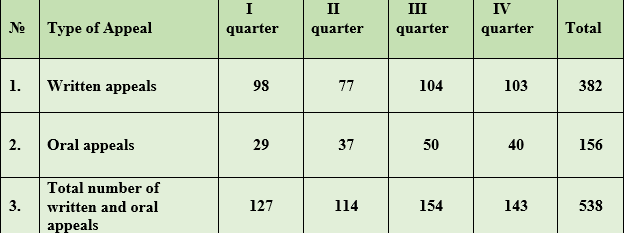
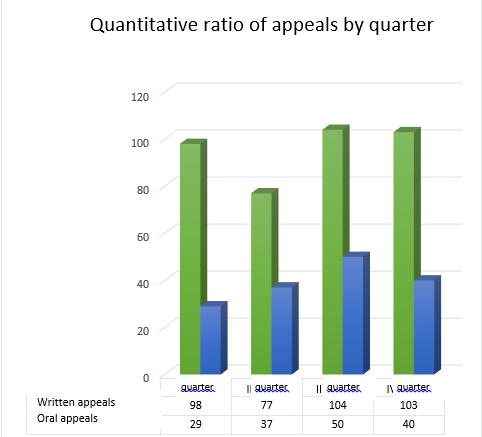
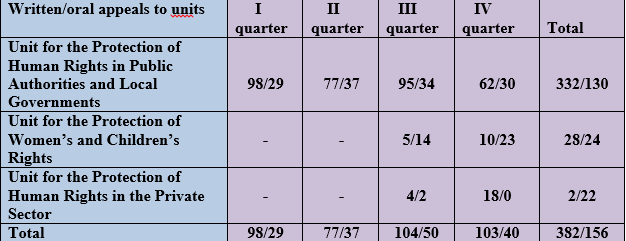
As can be seen from the figures above, although the number of registered written appeals decreased in the second quarter, it increased in the first, third and fourth quarters. The number of oral appeals also decreased in the first quarter and increased in the second, third and fourth quarters.
Thus, compared to 2023, in 2024, the number of appeals registered in writing decreased by 17 (4.26%), and the number of appeals submitted orally decreased by 7 (4.29%).
Based on the above, we believe it would be correct to explain the decrease in the number of registered written and oral appeals in the year under review compared to 2023 by the fact that some of the issues faced by citizens across the country were being addressed positively on the ground.
In this part of the Report, it should also be noted that in order to increase awareness and legal literacy of the population, responsible staff of the Ombudsman’s Office continue to regularly post human rights regulations on the Ombudsman’s website, including rules governing the procedure for reviewing citizens’ appeals.
This section of the Report provides an overview of the written appeals received by the Office of the Ombudsman during the past year.
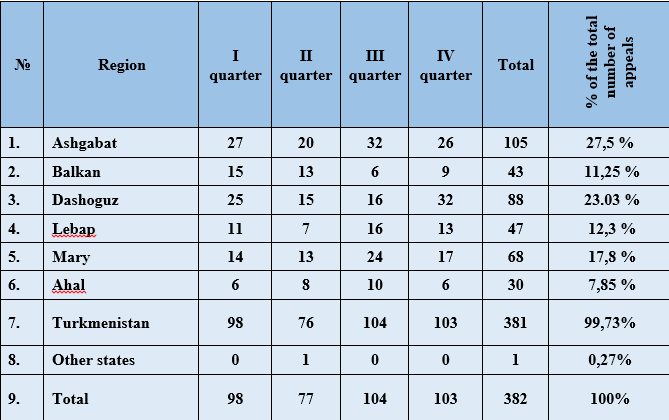
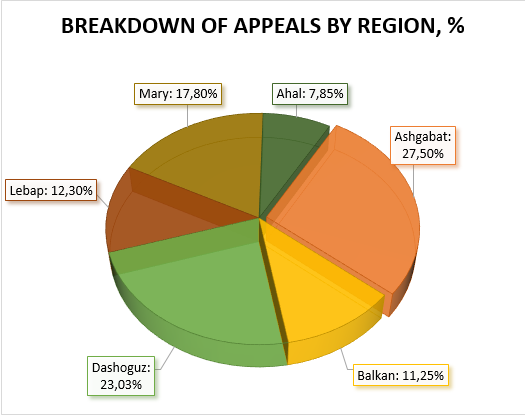
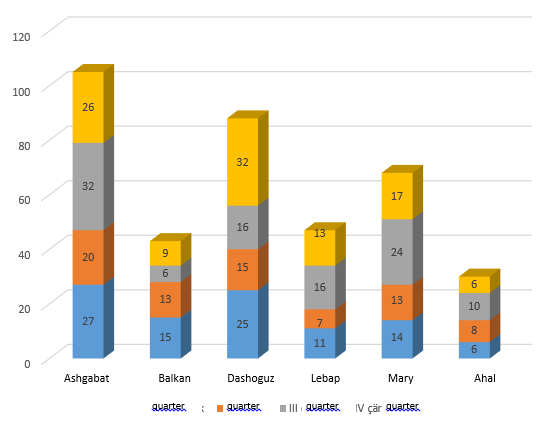
As can be seen in the above charts, the largest number of written appeals received by the Ombudsman’s Office, namely 105, came from Ashgabat, which is 27.5%, followed by 43 appeals from the Balkan region, which is 11.25%, 88 appeals from Dashoguz region, which is 23.03%, 47 appeals from Lebap region, which is 12.3%, and 68 appeals from Mary region, which is 17.8%. The smallest number of appeals came from Ahal region - 30 complaints, which is 7.85% of the total number of registered appeals. During the period under review, 1 appeal was received from a foreign citizen residing in the Russian Federation (0.27% of the total number of registered appeals), however, in accordance with part 2 of Article 19 of the Law of Turkmenistan “On the Ombudsman”, i.e. since the Ombudsman handles complaints from foreign citizens residing in Turkmenistan, the appeal of this citizen was not considered, despite the fact that it was registered.
In accordance with the provisions of Article 21 of the Law of Turkmenistan “On the Ombudsman”, the Ombudsman shall not allow for any privileges or restrictions, regardless of any signs, when considering citizens’ appeals. The tables below provide information on the results of quarterly analyses on the gender, ethnicity and region of persons who applied in writing, including collectively, to the Office of the Ombudsman during the year.
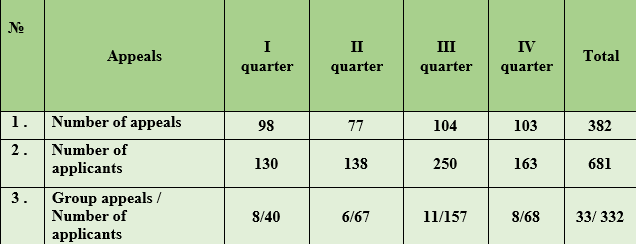
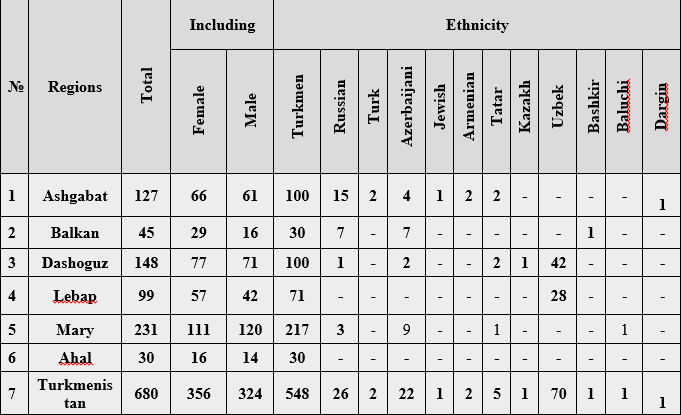

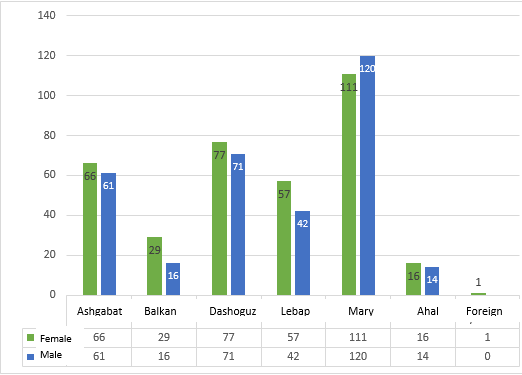
As can be seen from the data provided, in the year under review, a total of 382 written appeals were received from 681 citizens, including 33 collective appeals submitted by 332 citizens. During 2023, 399 appeals were received in writing from 598 citizens, including 36 collective appeals from 235 citizens. Although the number of mass appeals in the reporting year decreased by 3 appeals, the number of citizens participating in collective appeals increased by 97.
The figures above show that citizens who have submitted written appeals to the Ombudsman’s Office are representatives of different nationalities. According to Part 1 of Article 25 of the Law of Turkmenistan “On the Ombudsman”, the Ombudsman’s activities shall be carried out in the state language of Turkmenistan, and according to Part 2 of the same Article, those who apply to the Ombudsman shall have the right to apply in their native language or another language they know. In this case, the applicant shall be given an answer in the state language with the translation into the language known to him.
Citizens who contacted the Ombudsman in writing raised various issues in their appeals concerning the protection of their rights. Thus, in this section of the Report, an analysis of the issues raised in each appeal was conducted by region, which is presented in the tables below.
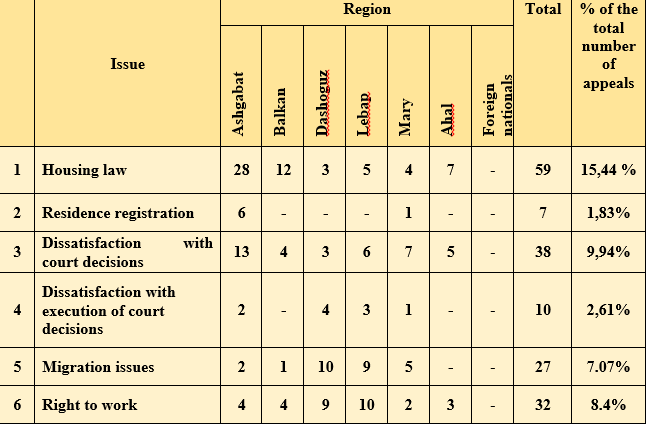
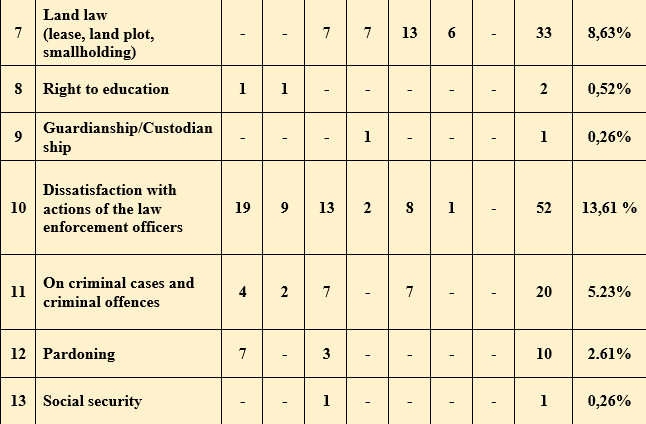

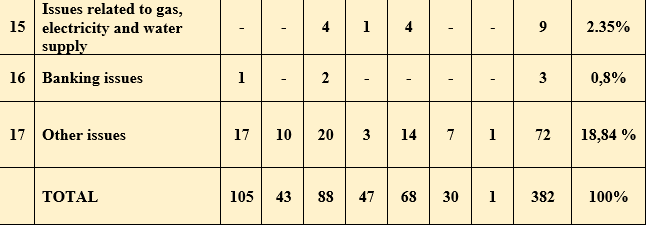
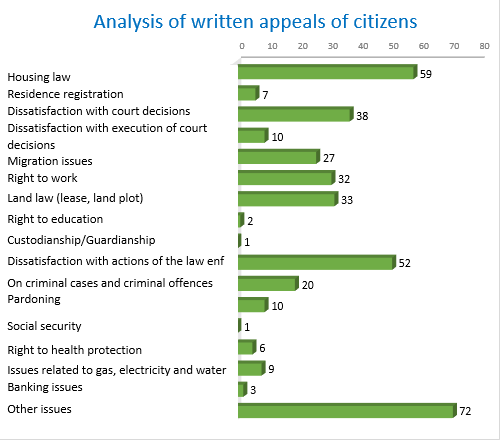
As can be seen from the above indicators, the majority of written appeals from citizens, as in previous years, were related to housing law issues, 59 of them, which amounted to 15.44% of the total number, which is 31 appeals less compared to 2023, when 90 citizens’ appeals were received on housing law issues, which amounted to 23.07% of the total number. For example, the current Report states that the appeals received on housing and legal issues in the year under review concerned not only obtaining housing, but also improving housing conditions, 3 appeals - 5.08%.
If in the previous year one of the main issues was issue related to residence registration, this year the number of applicants with this type of issues decreased, there were 7 complaints in total, which amounted to 1.83% of the total number of complaints (in 2023 - 16 or 4.1%), issues related to dissatisfaction with the execution of court orders - 10, which was 2.61% of the total number of appeals (in 2023 - 13, or 3.33%), 2 appeals related to the right to education were accepted, which amounted to 0.52% of the total number of appeals (in 2023 - 6, which was 1.53%), appeals related to guardianship and custodianship - 1, which was 0.26% of the total number of appeals (in 2023 - 2, or 0.51%), 20 appeals related to criminal cases and criminal acts were accepted, which was 5.23% (in 2023 - 25, or 6.41%), 10 appeals related to pardoning, which was 2.61% (in 2023 - 13, or 3.33%), related to social security issues - 1 appeal, or 0.26% (in 2023 – 5, or 1,3%), 6 appeals related to health protection, which amounted to 1,6% (in 2023 – 8, or 2,05%).
Also, compared to the previous year, the number of some appeals increased, including 27 appeals related to migration issues, which was 7.07% of the total (in 2023 - 11 appeals or 2.82%), 32 appeals related to labour rights, which was 8.4% of the total (in 2023 - 24 appeals or 6.15%), 33 appeals were related to land rights, which was 8.63% of the total (in 2023 - 21 appeals or 5.4%), 52 appeals were related to dissatisfaction with the actions of law enforcement officers, which was 13.61% of the total (in 2023 - 25 appeals or 6.41%), 38 appeals were related to dissatisfaction with court decisions, which was 9.94% of the total (in 2023 - 37 appeals or 9.5%), including 9 appeals related to gas, water and electricity supply issues, which was 2.35% of the total (in 2023 - 8 appeals or 2.05%), 3 appeals were related to banking issues, which was 0.8% of the total (in 2023 - 1 appeal or 0.25%). The number of appeals on other issues also decreased compared to the previous year, 2023, and amounted to 72, which was 18.84% of the total (in 2023 - 74 appeals or 18.97%).
The remaining issues, as in previous years, were mainly appeals from citizens about related to the actions of heads of institutions or officials, disputes over debts, property, family or neighbourhood disputes, explanations of legislation, lack of responses to appeals to institutions and organizations, dissatisfaction with the answers provided, assistance in obtaining the necessary documents from institutions and organizations, and various issues that arise in everyday life.
When analyzing the issues raised in the appeals, attention was garnered to the regions where certain issues arose most frequently, namely: housing rights in Ashgabat, including improving housing conditions, residence registration issues, complaints about court rulings, actions of law enforcement officials, pardons and other issues; housing rights, complaints about law enforcement officers and other issues - in Balkan region; in Dashoguz region - migration issues, labour law issues, land law, complaints about law enforcement officials, criminal cases and criminal acts and other issues; in Lebap region - complaints about court rulings, migration issues, labour law, land law; in Mary region - complaints related to land law, court rulings, actions of law enforcement officials, criminal cases and criminal acts and other issues; in Ahal region - appeals related to housing rights, land legislation and other issues were among the most important.
The analysis also noted that the number and percentage of complaints related to housing rights, registration, complaints about the execution of court orders, the right to education, guardianship and custodianship, criminal cases and criminal acts, pardon, social security, the right to health protection and other issues in the year under review decreased compared to the previous year, while the number and percentage of issues raised in the remaining appeals increased in the year under review compared to the previous year.
After receiving appeals from citizens to the Office, the Ombudsman decides whether to accept it for consideration, to refuse to accept it, or to explain to the applicants the legal means of protecting their rights and freedoms.
After a thorough study of the issues raised in the accepted appeals in the year under review, on the basis of Article 27 of the Law of Turkmenistan “On the Ombudsman”, assistance was requested in verifying the evidence presented in the appeals, that is, the Ombudsman’s requests were sent to authorized State bodies, including local executive bodies and officials, and the results of the inspections carried out on them, provided these results satisfied the Ombudsman, were forwarded to the applicants.
During the period under review, letters of recommendation were sent to the relevant authorities on the basis of Article 30 of the Law of Turkmenistan “On the Ombudsman”.
Depending on the issues raised by citizens in their appeals, some of them were sent for consideration in accordance with the procedure established by law. The appeals filed in accordance with the relevant provisions were primarily sent to the Supreme Court of Turkmenistan and the relevant Body for Religious Affairs of Turkmenistan, and letters of reply were forwarded to citizens based on the results of consideration of the appeals.
In addition, in accordance with paragraph 2 of part 1 of Article 18 of the Law of Turkmenistan “On the Ombudsman”, relevant documents were received and studied for some appeals, and letters of reply were sent to citizens based on the results.
During the reporting period, appeals were received for which recommendations were made in accordance with Article 30 of the Law of Turkmenistan “On the Ombudsman”, for assistance in conducting inspections in accordance with Article 27 of the said Law, as well as the documents reviewed by obtaining, in accordance with paragraph 2 of part 1 of Article 18 of the Law of Turkmenistan “On the Ombudsman”, on which satisfactory decisions were made, and they are described in detail in Chapter VIII of the Report “Statements and proposals of the Ombudsman”.
Also, complaints that do not meet the requirements set out in the Law of Turkmenistan “On the Ombudsman” remained without consideration, that is, those that did not state the essence of the complaint, were not signed, the deadline for filing was violated, or contained issues beyond the competence of the Ombudsman’s Office and appeals containing previously considered issues that were answered.
In addition, the applicants were provided with a response within the time limit prescribed by law, namely within five days, regarding the decision to accept the appeal for the Ombudsman’s proceedings or to refuse its handling and grounds for it.
The below table shows the results of the analysis of appeals received by the Ombudsman ensuing from their study by region. In addition to those accepted for handling during the reporting period, the table included pending appeals at the beginning of the reporting year that were not considered in 2023.
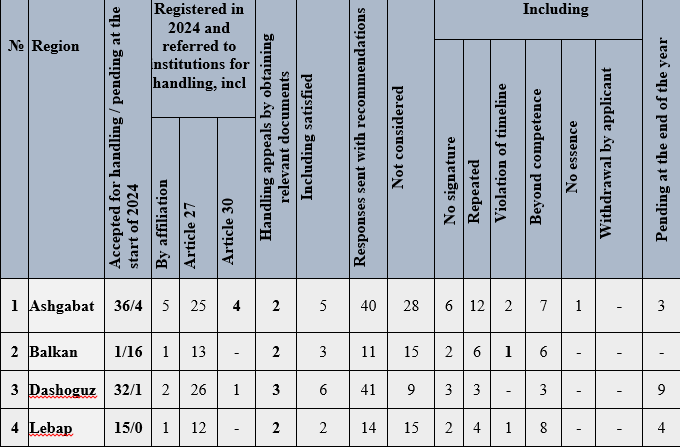

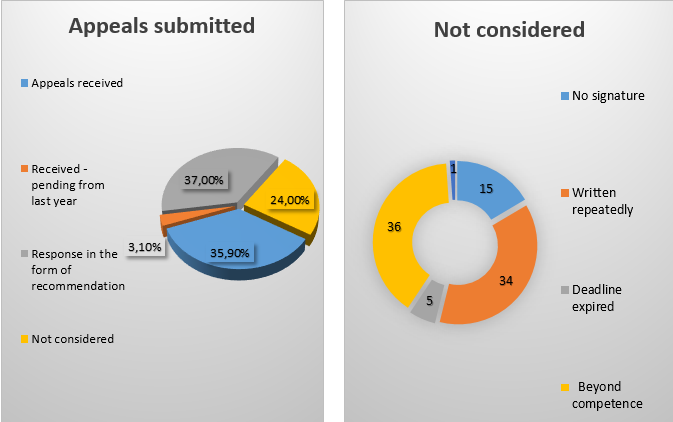
As can be seen from the above chart and descriptions, of the 382 appeals received by the Ombudsman’s Office in the reporting year, 14 were written repeatedly on the same issues outlined in the original 9 appeals - before receiving a response to the first appeals submitted by citizens. Since the issues raised in these appeals were identical, they were reviewed together with previously submitted appeals.
In the year under review, more than a third of the written appeals received by the Office, namely 140 or 37%, were answered in the form of recommendations explaining to citizens the legitimate ways to protect their rights and freedoms. These were recommendations that, in accordance with current legislation, helped the citizens who applied to take legal action on their issues. Also, 91 appeals or 24% pending during the period under review were left without consideration due to the fact that, in accordance with the provisions provided for by the Law of Turkmenistan “On the Ombudsman”, the content of the appeal was not indicated, the signature was not provided, the deadline for submitting the appeal was violated, and complaints were written on the issues outside the competence of the Ombudsman.
In addition, 7 appeals or 3.1% of the total number of appeals pending from 2023, and 137 appeals, which was 35.9% for the reporting period were examined. Of the pending appeals, 7 were forwarded to the competent authorities with a request for assistance in conducting an investigation based on Article 27 of the Law of Turkmenistan ‘On the Ombudsman’, and for 2 of them a specific opinion on the inspection outcome was requested and a proposal was sent based on Article 30 of the Law of Turkmenistan “On the Ombudsman”; all of them were reviewed in the reporting year.
Also, 35.9% of the total number of complaints received last year, that is, out of 137 appeals, 104 were forwarded to the competent authorities with a request for assistance in verifying the evidence presented in the appeals, based on Article 27 of the Law of Turkmenistan “On the Ombudsman”, and 11 appeals were sent to the relevant authorities. In addition, in accordance with paragraph 2, part 1 of Article 18 of the Law of Turkmenistan “On the Ombudsman”, 17 appeals have been reviewed and the relevant documents have been obtained. Pursuant to Article 30 of the Law of Turkmenistan “On the Ombudsman”, recommendations were issued to the competent authorities on 5 appeals. Thus, out of 151 appeals (including 14 combined appeals) received by the Ombudsman’s Office in 2024, 132 were considered, of which 22, or 16.7%, were satisfied, and 19 were left without consideration by the end of the year. The satisfied petitions are described in chapter VIII “Statements and proposals of the Ombudsman”.
In this section of the Report, in accordance with the above mentioned and the table provided, a regional analysis of appeals registered in 2024 was also conducted, 14 of which were reviewed jointly with previously submitted appeals.
Thus, in the city of Ashgabat, 1 of the appeals was considered by combining, 2 more - by obtaining documents from the relevant authorities, 25 or 67.6% - by forwarding to the authorized bodies on the basis of Article 27 of the Law of Turkmenistan “On the Ombudsman”, 4 - by sending an advisory proposal to the authorized bodies in accordance with Article 30 of the said Law, 5 - by referral of jurisdiction to the Supreme Court of Turkmenistan. Of the 37 handled appeals, 5 or 13.5% were satisfied, and 3 appeals were left without consideration by the end of the year.
In the Balkan region, 1 of the appeals was considered by combining, 2 - by requesting relevant documents from the field, 13 or 76.5% - by forwarding them to authorized state bodies on the basis of Article 27 of the Law of Turkmenistan “On the Ombudsman”, 1 - by sending them to the Supreme Court of Turkmenistan. Of the 17 reviewed appeals, 3 or 17.6% were satisfied.
In the Dashoguz region, 6 appeals were considered by combining, 3 - by requesting relevant documents from the field, 26 or 68.4% - by sending to the competent authorities on the basis of Article 27 of the Law of Turkmenistan “On the Ombudsman”, 1 - by sending a recommendation to the competent authorities pursuant to Article 30 of the said Law and 2 - by referrals of jurisdiction to the Supreme Court of Turkmenistan. Of the 38 reviewed appeals, 6 or 15.8% were satisfied at the end of the year, and 9 appeals remained without consideration.
In the Lebap region, 3 appeals were considered by combining, 2 - by obtaining relevant documents, 12 or 66.7% - by sending to the competent authorities on the basis of Article 27 of the Law of Turkmenistan “On the Ombudsman” and 1 - by sending to the Supreme Court of Turkmenistan. Of the 18 reviewed appeals, 2 or 11.1% were satisfied at the end of the year, and 4 appeals remained without consideration.
In Mary region, 1 of the appeals was considered by combining, 4 - by obtaining relevant documents, 20 or 74% - by sending to the competent authorities on the basis of Article 27 of the Law of Turkmenistan “On the Ombudsman” and 2 - by forwarding to the Supreme Court of Turkmenistan. Of the 27 reviewed appeals by the end of the year, 5 or 18.1% were satisfied, and 3 appeals remained without consideration.
In Ahal region, 2 appeals were considered by combining, 4 - by obtaining relevant documents from the field, 8 or 57.1% - by sending to the competent authorities based on Article 27 of the Law of Turkmenistan “On the Ombudsman”, 1 or 7.1% of the 14 considered appeals were satisfied.
It was noted above that after the Ombudsman accepted written appeals from citizens to the competent authorities, requests for assistance in verifying the arguments or recommendations presented in the appeals were sent to the relevant authorities, and documents received from the competent authorities were reviewed. Thus, an analysis of handling of proposals, directions for affiliation by the authorities and of conducting inspections and requests for documents was carried out.
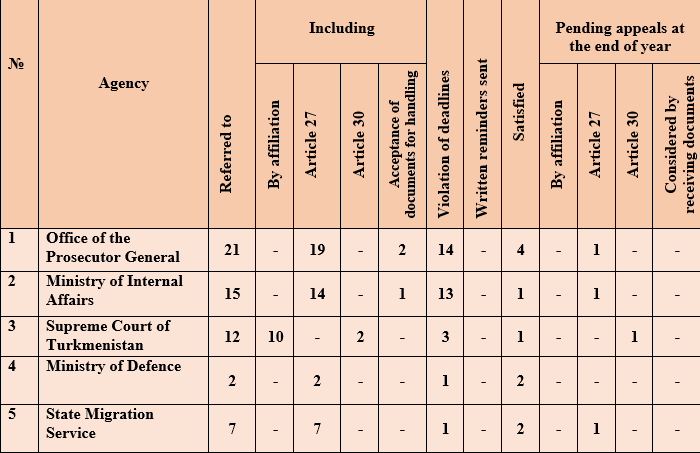
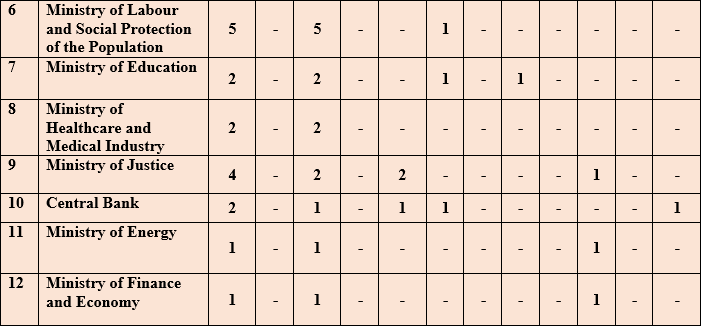
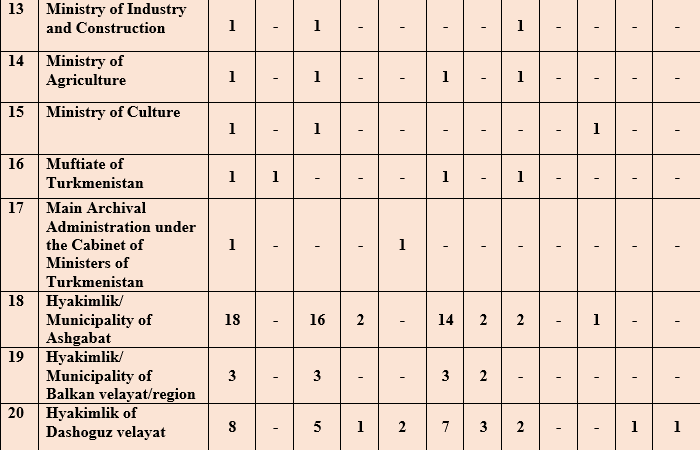

According to the above table, compiled based on the results of the analysis, of the written appeals received by the Ombudsman’s Office, 104 were accepted for handling on the basis of Article 27 of the Law of Turkmenistan “On the Ombudsman”, and 5 more were sent to the competent authorities on the basis of Article 30 of the said Law, indicating the time frame for their consideration. Concurrently, 11 of the received appeals were forwarded for consideration based on their affiliation, and 14 were considered by obtaining relevant documents from authorized bodies, as a result of which 15 out of 134 appeals remained unresolved as of the end of the year.
Thus, for 134 appeals submitted for consideration by affiliation, reviewed by receiving relevant documents from the competent authorities, as well as those sent to the competent authorities with a proposal and request for assistance in consideration, 83 or 61.9% of the responses were overdue.
According to the results of the analysis of appeals with overdue responses, 14 of the 18 appeals sent to the hyakimlik of the city of Ashgabat were overdue. A reminder was sent for two of these requests, two of them were satisfied, and one was left for consideration until the end of the year. Of the 3 appeals sent to the hyakimlik of the Balkan region, all 3 replies were overdue. A reminder letter was sent for two of these appeals. Of the 8 appeals sent to the hyakimlik of Dashoguz region, 7 answers were overdue. A reminder was sent for three of these appeals, two were satisfied, and two were left for consideration until the end of the year. Of the 5 appeals sent to the hyakimlik of Lebap region, 4 were tardy, 1 was satisfied, and 1 was left for consideration by the end of the year. Of the 14 appeals sent to the hyakimlik of Mary region, 12 replies were overdue. A reminder was sent for 5 of these requests, 2 were satisfied, and 2 were left for consideration by the end of the year. Of the 7 appeals sent to the hyakimlik of the Ahal region, 6 responses were overdue. A reminder letter was sent for 4 of these requests, 1 of which was satisfied. Of the 21 appeals submitted to the General Prosecutor’s Office of Turkmenistan, 14 replies were overdue, 4 were satisfied, and 1 was left for consideration by the end of the year. Of the 15 appeals sent to the Ministry of the Interior Internal Affairs of Turkmenistan, 13 replies were overdue, 1 was satisfied, and 1 was left for consideration by the end of the year. Of the 12 appeals submitted to the Supreme Court of Turkmenistan, 3 replies were overdue, 1 was satisfied, and 1 was left for consideration by the end of the year. Of the 2 appeals sent to the Ministry of Defense of Turkmenistan, 1 response was overdue, but 2 were satisfied. Of the 7 appeals submitted to the State Migration Service of Turkmenistan, 7 were overdue, 2 were satisfied, and 1 was left for consideration by the end of the year. Of the 5 appeals sent to the Ministry of Labour and Social Protection of the Population of Turkmenistan, 1 reply was overdue. Of the 2 appeals sent to the Ministry of Education of Turkmenistan, 1 was overdue, and 1 was satisfied. Of the 4 appeals sent to the Ministry of Justice of Turkmenistan, 1 appeal remained without consideration at the end of the year. Of the 2 appeals sent to the Central Bank of Turkmenistan, 1 response was overdue, and 1 was left without consideration at the end of the year. 1 appeal sent to the Ministry of Energy of Turkmenistan and 1 appeal sent to the Ministry of Finance and Economy of Turkmenistan remained without consideration until the end of the year. 1 appeal submitted to the Ministry of Industry and Construction Production of Turkmenistan has been satisfied. 1 of the appeals sent to the Ministry of Agriculture of Turkmenistan was answered and completed later than the deadline. One appeal sent to the Ministry of Culture of Turkmenistan was left without consideration at the end of the year. The reply to 1 appeal sent to the Mufti of Turkmenistan was overdue.
When analyzing appeals with late responses, cases of late consideration were identified due to the irresponsible approach of the heads of local executive bodies and agencies, which led to a late response to citizens’ appeals. The latter, in turn, forced them to repeatedly contact the Ombudsman’s Office. Reminder letters were sent to the relevant managers in order to draw their attention to appeals that were not answered within the time limits established by law.
In addition, when analyzing the above-mentioned situations, it was identified that some appeals submitted with an overdue and untimely response, especially requests submitted to the Prosecutor General’s Office of Turkmenistan, the Ministry of Internal Affairs of Turkmenistan, and the Supreme Court of Turkmenistan, required additional checks to analyze all issues and, since it took time, it was found that the exceeded deadlines for their consideration were justified.
As can be seen from the above, some appeals were postponed to a later date due to the need for additional checks. Based on these practical issues faced, it was proposed to amend the Law of Turkmenistan “On the Ombudsman” regarding the timing of consideration of the Ombudsman’s requests. The Law of Turkmenistan “On Amendments and Additions to certain legislative acts of Turkmenistan”, adopted on 30 November, 2024, along with other additions and amendments to the Law of Turkmenistan “On the Ombudsman”, also amended Article 27 of this Law, which states that “In the event of necessity to conduct additional inspections on the issue, the time limit specified in the complaint for consideration of the complaint, determined by the Ombudsman, may be extended by an official for a period of no more than one month.
Concurrently, within three days from the date of the extension of the time limit for consideration of the complaint, he/she shall be obliged to inform the Ombudsman in writing in connection therewith”. The introduction of this addition established the legal basis for the required time limits for a more thorough review of appeals.
During the year under review, 156 oral appeals from citizens who contacted the Ombudsman’s Office were registered, which were analyzed separately by region of the country and presented in the tables below.
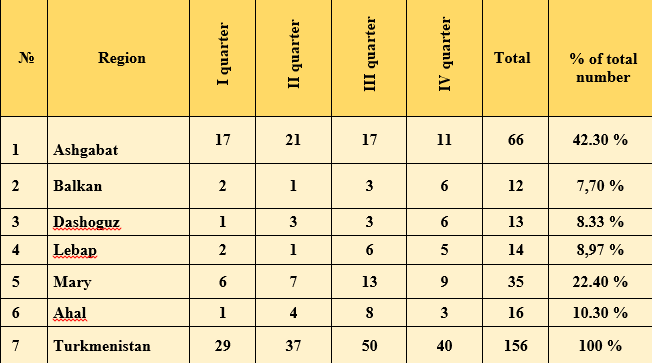
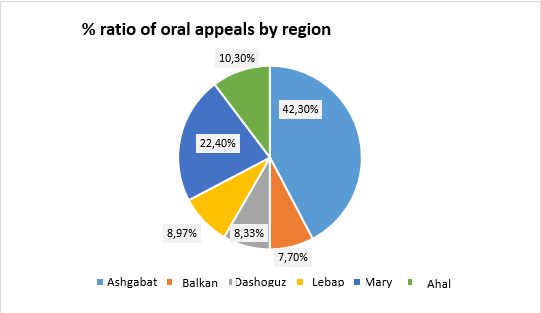
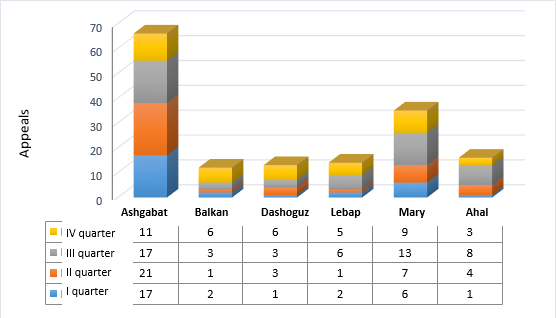
As shown above, as in previous years, the majority of oral appeals, namely 66 - 42.30%, came from Ashgabat. One of the reasons for their large number was the location of the Ombudsman’s Office in Ashgabat and its accessibility to citizens who applied.
This section of the Report also included a quarterly review of oral complaints received during the year, and an overview of the number of citizens who filed complaints.


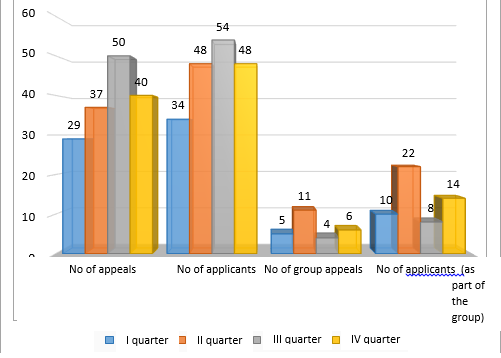
As can be seen from the analysis, in the year under review, a total of 156 oral appeals were received from 184 citizens, 54 of them were group appeals. For comparison, in 2023, 163 oral appeals were received orally, and 189 citizens applied, of which 48 were group appeals, which is 6 more people than in the year under review.
An analysis was also carried out by gender and ethnicity of the citizens who applied. That is, of the citizens who applied, 119 were women and 65 men, and they were representatives of different nationalities, including 137 Turkmen, 11 Russians, 11 Azerbaijanis, 6 Armenians, 9 Uzbeks, 1 Persian, 1 Lezgin, 3 Tatars, 2 Ukrainians, 1 German and 1 Jew. In total, representatives of other nationalities accounted for 25.5% of the appeals.
The results of the analysis conducted on the national and other grounds of the applicants show that all of them had equal opportunities to exercise their rights. As mentioned above, just as responses to written appeals from citizens were translated into the language in which they have applied or into the language they knew, communication with citizens who have applied orally was also carried out in the language they knew, and they were provided with appropriate advice and clarification. In previous years, as well as in the year under review, there were no issues of misunderstanding of the content of written or oral responses provided by the Ombudsman’s Office.
The review of the issues stated in the oral appeals registered during the year, as well as the review of the compliance of the stated issues with the areas of concern, which is presented in the following tables, was carried out.
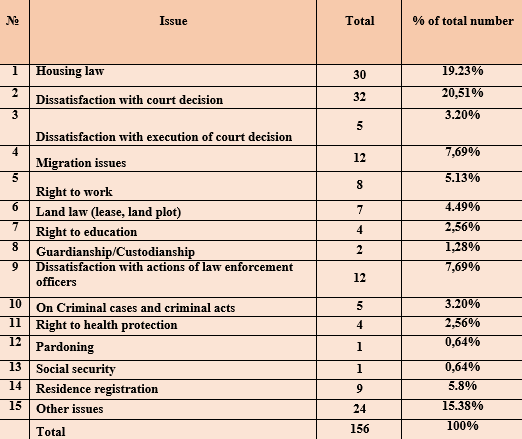
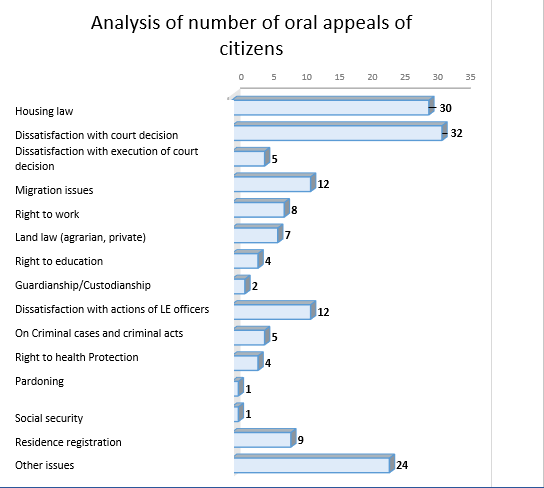
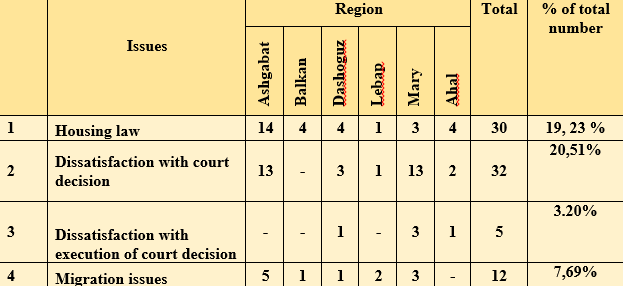
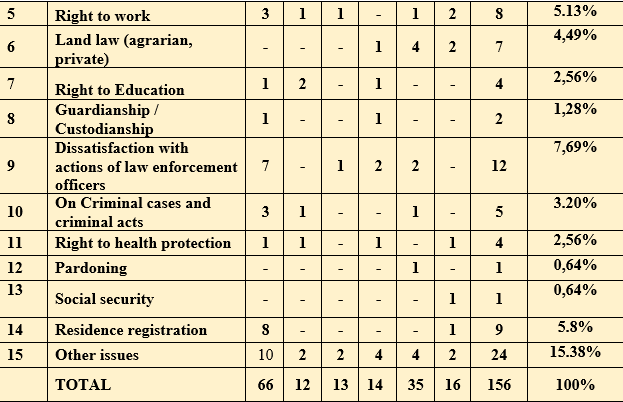
As can be seen from the above figures, the largest number of oral appeals from citizens, namely 30, which was 19.23% of the total number of appeals, were related to housing issues, 32 appeals related to complaints about court orders, which is 20.51% of the total number of appeals, 5 appeals related to complaints about the execution of court orders, this is 3.20% of the total number of requests, 12 requests were related to migration issues, which is 7.69% of the total number of appeals, 8 appeals related to labour law, which is 5.13% of the total number of appeals, 7 appeals related to land law, which is 4.49% of the total number of appeals, 4 appeals related to the right to education, which is 2.56% of the total number of appeals, guardianship issues received 2 appeals, which is 1.28% of the total number of appeals, 12 appeals - with complaints about the actions of law enforcement officials, which is 7.69% of the total number of appeals, 5 appeals on criminal cases and criminal acts, which is 3.20% of the total number of appeals, 4 appeals on issues related to the right to health protection, which is 2.56% of the total number of appeals, 1 appeal related to the issue of pardon, which is 0.64% of the total number of appeals, 1 appeal related to the issue of social security, which is 0.64% of the total number of appeals, 9 appeals concerned registration issues, which is 5.8% of the total number of appeals. The remaining 24 oral appeals, or 15.38%, were related to other issues, namely, primarily citizens’ dissatisfaction with the actions of heads of institutions or officials, debts, family and neighborhood disputes, assistance in obtaining necessary documents from institutions and organizations, and various other issues that arise in everyday life. Of the 156 oral complaints, 1 complaint or 0.64% concerning social security was satisfied.
When analyzing the main issues that arise in the regions based on oral appeals from citizens, housing issues, complaints about court decisions, actions of law enforcement officers, migration and registration issues in Ashgabat, complaints about court decisions in Mary region were highlighted.
At this stage of the report, as a result of the analysis of written and oral appeals, it was considered advisable to focus on the issues of mass appeals of citizens both on quarterly basis and by region.
As can be seen from the above indicator, 33 written mass appeals from 332 applicants were registered during the reporting period, most of them from Dashoguz, Lebap and Mary regions. There were 10 appeals from 70 people from Dashoguz region, 2 complaints were filed against the actions of law enforcement officers, 1 - on criminal cases and criminal acts, 1 - on court orders, 1 - on gas, electricity and water supply, 2 - on labour rights, 1 - on social security, 2 - on other questions. 60 people from Lebap region addressed with 8 appeals, 2 of them on labour rights, 4 on land rights, 1 on migration, 1 on other issues. 172 people from Mary region applied with 9 appeals, of which 1 - for housing rights, 1 - for land rights, 1 - for criminal cases and criminal acts, 4 - for gas, electric and water supply, 2 - for other issues. In addition, 4 appeals from 22 people were received from the city of Ashgabat, of which 2 were complaints about the actions of law enforcement officers, 2 on other issues. 4 people submitted 1 appeal from Balkan region, which referred to other issues. No group written appeals from Ahal Region were registered during the reporting period.
Some of the requests forwarded after the collective appeals were satisfied, and they can be found in Chapter VIII “Inquiriess and Proposals of the Ombudsman” of the Report.
Also, as can be seen from the above indicators, 26 group oral appeals from 54 citizens were registered during the period under review. 13 appeals from 26 citizens were received from the city of Ashgabat, 2 of the 13 questions were related to housing rights, 1 to labour rights, 1 to migration issues, 2 to registration issues, 3 to criminal cases and criminal acts, 1 to questions about the court order, 2 to appeals about actions of law enforcement officers, 1 - regarding other issues. From Balkan region, 1 group appeal was received from 2 citizens with a question about the court’s decision. 3 group appeals from 6 citizens were received from Dashoguz region, 2 of the 3 issues were complaints about court rulings, and 1 related to other issues. From Lebap region, 1 appeal was received from 2 citizens, their question concerned housing law. There were 5 appeals from 10 citizens from Mary region, 1 regarding housing law, 1 regarding court rulings, 1 regarding land rights, 1 regarding the issue of pardon, and 1 related to other issues.
In order to ensure compliance with the law when considering citizens’ appeals by the Office of the Ombudsman along with assistance in reducing appeals and repeated appeals from citizens, the following is proposed:
Chapter V. Work of the Ombudsman to assist improving the national legislation of Turkmenistan
Along with the important events that took place in the country in 2024, which was declared the year of “The Fount of Wisdom of Magtymguly Fragi”, it was the year in which legislative acts were adopted, acts of the President of Turkmenistan, national programmes and plans, concepts and policies designed to provide a legal framework for regulating various aspects of the country’s development and fully ensure and realize civil, political, economic, social and cultural human rights. Turkmenistan, being a participant to a number of international instruments regulating various aspects of international relations, is known as a country actively engaged in international relations. Being a party to these instruments containing universally recognized norms of international law, Turkmenistan acts as a country committed to its international obligations to implement these norms into national legislation and in practice. The meeting of the Presidium of the Halk Maslahaty of Turkmenistan in February 2024, chaired by the National Leader of the Turkmen people, Chair of the Halk Maslahaty of Turkmenistan Gurbanguly Berdimuhamedov, became one of the main steps towards the socio-economic development of the country and the improvement of the national legislative system. The main objective of the meeting was to consider urgent tasks for the successful implementation of the “Programme of Socio-economic Development and Investments in Turkmenistan for 2024”. During the meeting, the importance of developing draft regulatory legal acts for the effective functioning of the innovation system was emphasized in order to increase the pace of scientific research, in-depth and effective study of Artificial Intelligence, creation and development of new methods of doing business and commerce in the field of science and production. In this regard, the improvement of legislation in the field of civil law relations, the introduction of international private law, the upgrade of property law, property rights, contract law, the prevention of offenses, the sale of public services through digital systems, legal aid, government support for entrepreneurship, economic activity, transport and logistics, the development of digital services in various fields, ensuring the functioning of enterprises and the competitiveness of goods, improving legislation for construction work, analyzing and conducting important work on issues such as agricultural producers, promoting breeding activities, climate change, and environment were identified as important areas of legislative work in our country. As part of ensuring social protection, it was noted that the development of Regulations on guardianship and custodianship bodies and Regulations on the procedure for Guardianship and Custodianship, defined by the Law of Turkmenistan “On Guardianship and Custodianship”, in accordance with the requirements of the time, was of great importance from the prospective of fulfilling the requirements of the law. The Gurbanguly Berdimuhamedov Charitable Foundation has also accumulated positive experience in the area of providing assistance to children in need of care. In addition, in order to protect and support the younger generation, the need to improve normative legal acts covering relations concerning minors was emphasized. Concurrently, it was noted that preserving the dignity of our mothers and women, protecting their legitimate interests, and strengthening the legal foundations for ensuring the best interests of children were among the urgent demands of the time. The need to improve legislation on the implementation of the “Programme of socio-economic development of Turkmenistan and Investments for 2024” on the basis of legislative initiatives, legislative support for initiatives, instructions and decisions put forward by the President of Turkmenistan was underlined.
Assistance in improving national legislation is one of the main objectives of the Ombudsman pursuant to the Law of Turkmenistan “On the Ombudsman”. As part of the work carried out in this area in accordance with the legislative activity plan of the Mejlis of Turkmenistan, responsible employees of the Ombudsman’s Office participated as members in meetings of working groups established in the Mejlis to develop draft laws, expressed their opinion and comments on the proposed draft laws. Relevant proposals were also made on draft laws developed by the Mejlis of Turkmenistan and submitted to the Office of the Ombudsman. When making proposals on the draft laws, the compliance of the provisions of the draft law with the principles of the Constitution of Turkmenistan, the norms of current national legislation, the standards of international human rights law, the goals of the comprehensive development of our society were analyzed.
In the reporting year, the Ombudsman’s Office reviewed the draft laws of Turkmenistan prepared by the Mejlis of Turkmenistan, including “On Amendments to the Code of Turkmenistan on Social Protection of the Population”, “On Amendments and Additions to the Code of Administrative Offences of Turkmenistan”, “On Amendments and Additions to the Law of Turkmenistan “On Diplomatic Service”, “On Amendments to the Law of Turkmenistan “On International Treaties of Turkmenistan”, “On Amendments to the Law of Turkmenistan “On the Ambassador Extraordinary and Plenipotentiary of Turkmenistan”, “On Amendments and Additions to certain legislative acts of Turkmenistan”, and suggestions and comments were provided thereto. Representatives of the Ombudsman’s Office participated in meetings of the working group on the preparation of a draft of the new version of the Civil Code of Turkmenistan and of the draft Law of Turkmenistan “On the Unified State Register of Voters” as members. All this shows that during the year 2024, the role of the Ombudsman’s Office in promoting legislative improvement was carried out through regular review of the legislative Work Plan of the Mejlis of Turkmenistan and draft laws submitted to the Mejlis of Turkmenistan, making appropriate proposals on them and through the participation of representatives of the Ombudsman’s Office in meetings of the working groups established in the Mejlis of Turkmenistan as the members thereto.
In order to improve the legal framework of the reforms carried out in our country, 3 meetings of the Mejlis of Turkmenistan were held in the year under review, during which 36 Laws of Turkmenistan and 26 resolutions of the Mejlis were passed. Among a number of passed laws, such laws can be specified as the Law of Turkmenistan “On the Establishment of the Jubilee medal of Turkmenistan “Magtymguly Pyragynyň 300 ýyllygyna”, “On Energy Conservation and Energy Efficiency”, “On Hydrometeorological activities”, “On the Cultural Heritage of Magtymguly Fragi”, the laws of Turkmenistan on amendments and additions to the Civil Procedural Code of Turkmenistan, the Family Code, the Sanitary Code, the Code of Administrative Offenses, the Labour Code, the Laws of Turkmenistan “On Land” and “On Taxes”. and the laws of Turkmenistan “On the State Budget of Turkmenistan for 2025”, “On Veterinary Medicine”, "On Advocacy and Practice of Law in Turkmenistan”, “On Vital Records”, “On Physical Culture and Sports”, “On State Scientific and Technical Policy”, “On Research Institutions”, “On Combatting Doping in Sports”, “On Public Service”, “On the Ombudsman”, “On Currency Regulation and Currency Control in Foreign Economic Relations”, “On Seed Production”, “On Diplomatic Service”, “On the Ambassador Extraordinary and Plenipotentiary of Turkmenistan”, “On International Treaties of Turkmenistan”.
In the second half of the last year, work was carried out on the tasks arising from the Decree of the President of Turkmenistan of 14 June 2024 “On Improving the Activities of the Ombudsman’s Office”. In particular, work was carried out to alter the structure and expand the staff of the Ombudsman’s Office. As a result, one unit operating in the Office of the Ombudsman was reorganized and two additional units were created.
Considering that the activities carried out by the Ombudsman for protection and enforcement of human rights in the country had a positive impact on the harmonious development of the state and society, and that the Ombudsman’s activities complemented existing state resources in the field of protection of human and civil rights and freedoms, in order to further improve the Ombudsman’s activities, a draft Law has been developed on changes and amendments to the Law of Turkmenistan “On the Ombudsman”. This draft law has been submitted to a working group established in the Mejlis of Turkmenistan and has been studied with the participation of representatives of the Ombudsman’s Office and proposed for adoption. On 30 November 2024, at the seventh session of the Mejlis of Turkmenistan of the VII convocation, the Law of Turkmenistan “On Changes and Amendments to Certain Legislative Acts of Turkmenistan” was adopted, which amended and supplemented a number of Articles of the Law of Turkmenistan “On the Ombudsman”.
Based on the adopted Law, the Law of Turkmenistan “On the Ombudsman” included provisions that expanded the scope of the Ombudsman’s activities for the protection of human rights, strengthened the structure of the Ombudsman’s Office and improved its work. In particular, in order to ensure respect for the work of the Ombudsman in the country toward the protection of human rights and freedoms, responsible approach and compliance with its legal requirements, a provision was added to Article 1 of the Law stating that the position of the Ombudsman was a public office. Amendments have been made to the provisions of Articles 1, 2, 19 and 21 of the Law, supplementing the powers of the Ombudsman to promote the implementation of state safeguards for the protection of human rights and freedoms not only by State authorities, local governments and their officials, but also by enterprises, institutions, organizations regardless of the form of ownership and other persons in helping to restore violated rights, human and civil rights and freedoms, and to improve the work of the Ombudsman in reviewing complaints. The rules set out in Article 30 of the Law have also been expanded, namely, the Ombudsman’s powers to apply to enterprises, institutions, organizations, officials and other authorized persons who have violated human and civil rights and freedoms with a recommendation for the immediate restoration of violated rights and freedoms, and the rules that the Ombudsman may also make proposals on the prevention of circumstances that may lead to violations of human and civil rights and freedoms. In addition, Articles 23 and 27 of the Law set the time limits for the consideration of complaints by the Ombudsman and defined the actions of authorized State bodies, local governments and officials to assist in the consideration of the Ombudsman’s appeals.
The amendments and changes made to the Law of Turkmenistan “On the Ombudsman” indicated that conditions were being created to support and further improve the activities of the Ombudsman for the protection of human rights, freedoms and the restoration of violated rights.
In order to implement the objectives outlined in the Law of Turkmenistan “On the Ombudsman”, the Strategic Plan of the Office of the Ombudsman of Turkmenistan for 2024-2028 was approved on the basis of Order No. 6 of 24 January 2024. The Office of the Ombudsman of Turkmenistan, in comparison with other structures, is a national human rights institution and has been steadily expanding its activities and functionality since its establishment in 2017. As part of the above-mentioned activities, in October 2022, with the support of the Asia-Pacific Forum (APF), national human rights institutions, the United Nations Development Programme (UNDP) and the Office of the United Nations High Commissioner for Human Rights (OHCHR), work was carried out to assess the capacity of the Office. The capacity assessment revealed the achievements of the Office, as well as the complexities and directions of the development of its capacity. During the assessment, it was noted that determining the long-term strategic direction of the Ombudsman’s Office was one of the key areas for further development of the Office.
Based on the above, in order to improve national legislation on human rights and promote the proper application of legislation, it is proposed:
Chapter VI. Participation of the Ombudsman in public events. Assistance in raising awareness in the field of human rights
In accordance with the requirements set out in the Law of Turkmenistan “On the Ombudsman”, one of the main areas of the Ombudsman’s work is to raise public awareness of the methods and means of protecting human rights in the country. In 2024, the Ombudsman and staff addressed the issue of raising public awareness of human rights in the country through the media and public statements. The work was carried out in the form of speeches and presentations on the foundations of human rights, on state guarantees in ensuring human rights and freedoms, on topics related to human rights, by publishing articles in newspapers and magazines, conducting interviews on TV and radio broadcasts, and organizing seminars/ workshops. Information on human rights standards safeguarded by the Constitution and legislation of Turkmenistan, on the activities carried out by the State to ensure human rights in the country, and related to various areas of human rights and freedoms was regularly posted on the website of the Ombudsman’s Office.
The year 2024, which was held under the motto “The Fount of Wisdom of Magtymguly Fragi", became one of the most successful historical years for Turkmenistan. The year has become one of the richest in political, social, cultural and mass activities, regional and international events dedicated to various areas of human rights. The Ombudsman and staff, as part of their duties, were actively involved in these events, combining the poems of the great thinker of the Turkmen people, Magtymguly Fragi, created by his inspiration, promoting justice, dedicated to universal human values and becoming our national principles with national legislation and State policy. In accordance with the approved Work Plan of the Ombudsman’s Office for 2024, during the year, the Ombudsman’s Office, together with national and international partners, conducted activities aimed at sensitization on human rights and outreach.
The Ombudsman participated in all political, social and cultural events of the State as a public official, whose activities complemented the existing state means of protecting human and civil rights and freedoms. Speaking about the Ombudsman’s participation in social and cultural events, her participation in the meeting of the Halk Maslahaty (People’s Council) of Turkmenistan on 24 September 2024 should be specifically mentioned. The participation of the Ombudsman as a member of this supreme representative body, along with representatives of all walks of life and different generations, shows that every issue discussed at the Halk Maslahaty of Turkmenistan is addressed on the basis of democratic principles. The Halk Maslahaty of Turkmenistan is an annual National Forum where important issues such as equality, justice, and the priority of human rights, reflected in our ancient national traditions and modern legislation, are traditionally discussed with people’s representatives. The Halk Maslahaty is a General Assembly, a meeting of the highest representative body, attended by representatives of the entire people of Turkmenistan, which creates wide opportunities for participants to discuss solutions to such important tasks as the socio-economic development of the country, further improvement of the situation of the people. At that meeting, such important documents as “On Measures to implement 2025 - the Year of International Peace and Trust” and “On Approval of the Strategy for the Development of the Research System in Turkmenistan in 2024-2052” were reviewed and approved.
As is known, the Ombudsman submits an Annual Report on the activities and the human rights situation in the country to the distinguished President of Turkmenistan. She also delivers this report to the Mejlis of Turkmenistan. In this regard, during the past 2024, the Ombudsman participated in the fifth, sixth and seventh meetings of the Seventh convocation of the Mejlis (Parliament) of Turkmenistan, held in accordance with the legislative plan of the Parliament. In addition, on 13 July 2024, the Ombudsman participated in the sixth meeting of the Seventh convocation of the Mejlis of Turkmenistan, where, in accordance with the agenda of the meeting and the requirements of the Law of Turkmenistan “On the Ombudsman”, she made a report on her activities in 2023 and the human rights situation in the country.
The Ombudsman’s Annual Report on the state of human rights in the country is promulgated in the media. The presentation of this Report to the public by a representative of the Ombudsman’s Office in August 2024 on the Altyn Asyr TV channel in the programme “The Society and Law” should garner special attention.
The Ombudsman is a member of the Interagency Commission for Ensuring Compliance with Turkmenistan’s International Obligations on human rights and international humanitarian law. The Ombudsman participated in three meetings of the Interagency Commission held last year and expressed the opinion on the harmonious observance of the principles and standards of human rights defined in international treaties of Turkmenistan and our national legislation. As a member of the Interagency Commission on Combating Human Trafficking, in 2024, the Ombudsman participated in three meetings of the Commission, where she articulated her opinion on various issues aimed at ensuring human rights and freedoms included in the agenda of the Commission meetings.
It is noteworthy that the Working Groups of Interagency Commissions, where the staff of the Ombudsman’s Office participate, are an effective platform for discussing issues in various areas of human rights. In addition, the representatives of the Ombudsman’s Office were members of the working groups established to develop draft laws in the relevant committees of the Mejlis of Turkmenistan and participated in meetings held throughout the year.
In the year under review, the Ombudsman and staff actively participated in training and advocacy events on various human rights issues.
Among them, the participation of the staff on 15 February 2024 at consultations on the occasion of the Day of the Diplomatic Official of Turkmenistan on the topic “Priority areas of Turkmenistan’s foreign policy”; on 16 February 2024 at the Institute of International Relations under the Ministry of Foreign Affairs of Turkmenistan at a festive event on the topic “Diplomacy of Turkmenistan: background, present and future”; at consultations on the topic “National Priorities for the protection of children and ensuring justice for them” in a meeting on “International Principles for the enforcement of economic, social and cultural rights related to labour law”; participation within the regional programme “Assistance to Building a Rule of Law in Central Asia” in a conference on Administrative Law; in a festive event on “Permanent Neutrality of Turkmenistan: the basis for economic and political growth”; in a seminar on “Prevention of Crimes related to Human Trafficking and Promotion of Safe Migration", where they expressed opinion about their vision, in relation to the issues raised.
In accordance with the Decree of the President of Turkmenistan of 27 February 2020 “On the Creation and Putting into operation of an electronic document management system and websites in Turkmenistan”, the website of the Ombudsman’s Office has been in operation since 16 April 2021. As stated above, this website highlights the activities of the Ombudsman carried out in accordance with the Law of Turkmenistan “On the Ombudsman”, as well as activities carried out in the domestic and foreign policy of the country and priority areas in the field of human rights. This website contains information about the human rights activities carried out by the Office of the Ombudsman of Turkmenistan, the norms of international and national legislation regulating human rights, events and seminars, published research articles by the staff of the Ombudsman’s Office, and is regularly updated.
In addition, the country’s press, publications, newspapers and magazines published articles by the Ombudsman highlighting the nature of multilateral activities, reforms and democratic transformations in Turkmenistan to protect human rights and freedoms, as well as to strengthen democratic values in the country. For example, the 27 September 2024 issue of the “Adalat” newspaper published an article entitled “The Halk Maslahaty of Turkmenistan - the source of State power”. It stated that the meeting of the Halk Maslahaty of Turkmenistan was another vivid evidence of the internationalization of our national democracy in the international space and the broad opportunities that democratic development created in the country for ensuring human rights.
Among the historical events of the country last year, the Ombudsman and representatives of her Office took part in events dedicated to the 33rd anniversary of the independence of the State. The Article “Independence is our National Pride”, published on 2 October 2024 in the successive issue of the “Ahal durmuşy” newspaper, was dedicated to this historic event. This Article described in detail that our independence, along with ensuring the political and economic sovereign development of the country, contributed to the development of national identity of the people, finding its rightful place in the development of human civilization, and provided the country, as a full-fledged participant in international relations, with the opportunity to express its political stance.
The celebration of the 29th anniversary of Permanent Neutrality, which is another major holiday for our country, and the participation of the Ombudsman and representatives of her Office in events related to this significant date are worthy to note. The article on “Recognition of the Turkmen Statehood” was published on 18 December 2024 in the issue of the “Ahal durmuşy” newspaper dedicated to this event. In this article, it was stated that every citizen of a Permanently Neutral country is proud to work for the progress and new achievements of our Motherland.
Due to the fact that the protection of human rights, ensuring the restoration of violated rights of an individual and raising public awareness on this issue constitute the core of the Ombudsman’s activities, the Ombudsman and staff, as in previous years, took an active part in events dedicated to the adoption of the UN Universal Declaration of Human Rights. As always, in their speeches the measures taken to protect human rights were highlighted. On the occasion of the 76th anniversary of the adoption of the Universal Declaration of Human Rights, an article on “Human Rights: Priorities” was published in the issue of the “Adalat” newspaper on 31 May 2024, and an article on “Protection of Human Rights: towards the protection of a perfect civil society” was published in the issue of the “Turkmenistan” newspaper on 31 July 2024, and in the issue of the same newspaper of 23 November 2024 - an article on “Constitutional safeguards of human rights”, in the issue of the newspaper “Watan” of 24 December 2024 - an article “Democratic Principles are strengthening”. In these articles, in addition to outlining the large-scale activities carried out in Turkmenistan in the name of freedom, peaceful life and human well-being, which is the highest value of our society and the State, guarantees of the rights, freedoms and interests of all people living in the country and their protection based on national legislation and generally recognized norms of international law, the activities of the Office of the Ombudsman implemented in this regard were also widely covered.
Children in our country are surrounded by special care and support, and all necessary conditions are being created for their comprehensive and harmonious development. It is clearly perceived that the activities carried out in this area are aimed at educating children not only on the basis of national spiritual values, but also in the spirit of universal human values. On 1 June of each year, on the day when International Children’s Day is celebrated all over the world, relevant articles by the staff of the Ombudsman’s Office were published in the country’s publications, such as in the issue of the newspaper “Нейтральный Туркменистан” of 1 June 2024 articles “Caring for children is a priority area of state policy”, “Children are a care of the State”, and in the electronic magazine “Arkadagly yaşlar” there was an article “Children are our future”. The above-mentioned articles outlined the foundations of legal, social, economic and organizational principles for the protection of children’s rights, freedoms and legitimate interests by the state, the creation of great opportunities to ensure the comprehensive development of the child, the fostering of high moral qualities in the child, patriotic and civic education in the spirit of respect for historical and national traditions, universal spiritual, cultural and social values. The relevant provisions of the Basic Law, the Constitution, and the activities of the Ombudsman’s Office in the field of prioritizing children’s rights were also highlighted.
An article published in the newspaper “Turkmenistan” on 14 May 2024 on the topic “Civil Society: The Law and Right” was dedicated to the Constitution Day and the National Flag of Turkmenistan. It stated that the Basic Law, which contained norms on independence, statehood and unity with universal values, created a solid legal basis for priority areas of state policy, as well as for ensuring political, labour, social, cultural and other fundamental rights of citizens.
In this regard, the proclamation of Turkmenistan as a country that has put an end to statelessness is also inextricably linked to human rights, and the plans implemented by our country in this regard were outlined in the article “The Triumph of the Principle of humanity”, published and offered to readers in the newspaper “Adalat” on 8 November 2024.
We also consider it necessary to note that the article “The Role of the Franchise Agreement in private business”, published in the journal “Democracy and Law” of the Institute of State, Law and Democracy of Turkmenistan, took 1st place in the competition of scientific and practical articles on the topic “Regular Work and Human Rights”.
Based on the results of the Ombudsman’s participation in public and cultural events during the year under review and her work to raise citizens’ legal awareness, public awareness of the reforms implemented in the country to protect human rights, we conclude that it is imperative to continue working to increase legal awareness, literacy and legal culture of the population, including of those responsible officials in the field of human rights, and we propose the following:
Chapter VII. International cooperation
Turkmenistan, based on the legal status of permanent neutrality, supports the principles of peacefulness, trust and cooperation in international relations. The expansion of collaboration with reputable international organizations is of particular importance for strengthening international friendship and harmony, developing regional and international cooperation in the interests of universal well-being.
By implementing strategic areas of multilateral diplomacy, Turkmenistan consistently puts forward constructive proposals and initiatives designed to consolidate the efforts of the international community to strengthen peace and security and ensure Sustainable Development Goals. Turkmenistan’s historic initiative to proclaim “Year 2025 as the International Year of Peace and Trust” was approved by a Resolution of the UNGA of 21 March 2024, adopted at the 63rd Plenary session of the 78th session with the support of 86 Member States.
Turkmenistan, as a full-fledged participant of the basic international human rights instruments, consistently fulfills its international obligations and makes a worthy contribution to the development of international law. By ensuring strict observance and reliable protection of human rights, our State not only consistently transposes universally recognized principles, standards and norms of international law into national legislation, it defines important areas and creates conditions for the realization of these rights.
In accordance with the fundamental principles of the United Nations - the Principles Relating to the Status of National Human Rights Institutions, the Paris Principles, the Office of the Ombudsman, as a national human rights body, maintains close cooperation on human rights with international organizations and national institutions in other countries. According to the Law of Turkmenistan “On the Ombudsman”, assistance in the development of international cooperation on human rights, the study and implementation of international standards, and assistance in fulfilling Turkmenistan’s international obligations in the field of human rights and freedoms remain key areas of activity of the Ombudsman of Turkmenistan.
The Ombudsman’s work to further strengthen international cooperation opens avenues of opportunities to study the experience and best practices of other countries and international organizations. This contributes to further improvement of the working methods of the Ombudsman and Office, and makes it possible to more effectively protect and promote human and civil rights and freedoms. By actively integrating human rights into the global sphere in close cooperation with the UN entities and other international partners, taking an active part in specialized human rights forums, the Office establishes useful contacts, while gaining the necessary experience.
The development and coordination of cooperation on human rights is carried out in accordance with the Strategic Plan of the Office of the Ombudsman of Turkmenistan for 2024-2028, approved by the Order of the Ombudsman of 24 January 2024. When developing this Plan, the principles and norms of national legislation aimed at ensuring human rights have been taken into account. Government programmes and plans, strategies, policies and concepts in the field of human rights, recommendations of international experts, in particular, the Asia-Pacific Forum on the results of the assessment of the Ombudsman’s Office, were taken into consideration.
In 2024, in accordance with the Strategic Plan and the Ombudsman’s Work Plan for 2024, as well as within the framework of joint projects, active cooperation with UN agencies and other international organizations regarding the “Development and Coordination of cooperation in the field of human rights” was continued. This formed a platform for expanding the powers of the Ombudsman and staff.
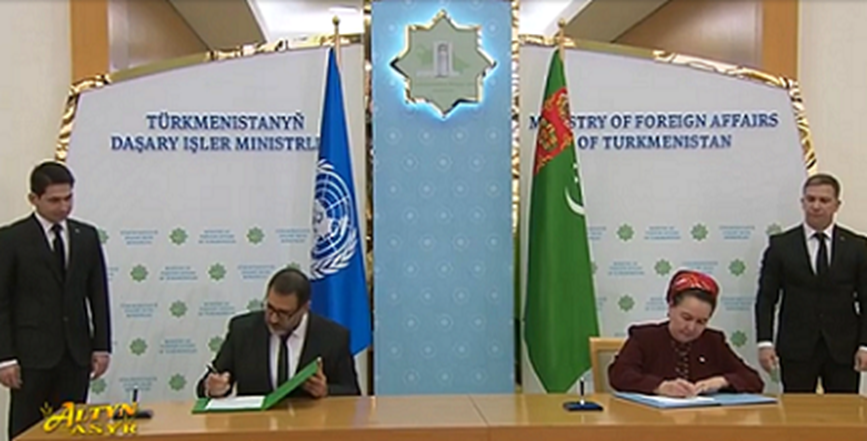
As part of the work carried out, in February 2024, the Work Plan for 2024 on the implementation of the Programme of the UNICEF for 2021-2025 of the Office of the Ombudsman of Turkmenistan and the UNICEF Representative Office in Turkmenistan was signed. The document provided joint measures to further promote children’s rights in Turkmenistan.
The representative office of the UNICEF in Turkmenistan is the main partner of the Office of the Ombudsman for the protection of children’s rights. As part of the partnership, strategic planning and evaluation were carried out, along with a number of other activities in accordance with the UNICEF plan, with the participation of representatives of government agencies dealing with children and children’s rights, local executive authorities and local governments responsible for the protection of children’s rights and justice.
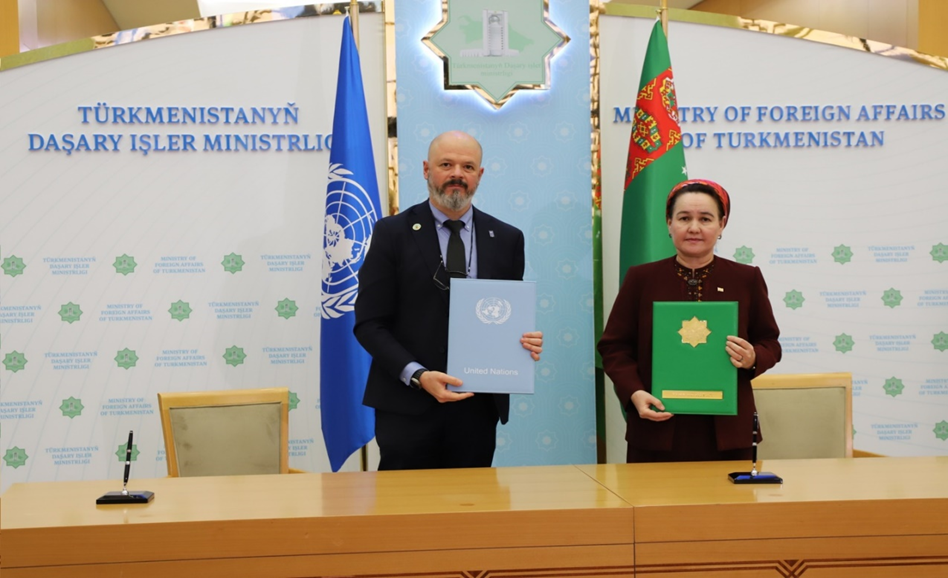
As part of the ceremony, a new version of the Project Document “Assistance to improving the institutional capacity of the Office of the Ombudsman of Turkmenistan” was signed between the Office of the Ombudsman and the UNDP Office. The UNDP has remained a reliable partner of the Ombudsman’s Office since the first days of the establishment of the latter.
Within the framework of this project, effective measures were taken throughout the year to steadily strengthen the capacity of the Ombudsman’s Office. In particular, workshops and conferences on improving legal literacy in various areas of human rights protection were held with the participation of staff members, and foreign study tours and meetings were organized to study the best practices of NHRIs in other countries. An application for accreditation of the Office in the Global Alliance of National Human Rights Institutions was submitted, documents were prepared, and dialogues with the Subcommittee for Accreditation of this organization were organized and conducted. During the reporting period, the signed Project Document was effectively implemented. Expert and other support was provided to strengthen the institutional capacity of the Ombudsman’s Office through the project.
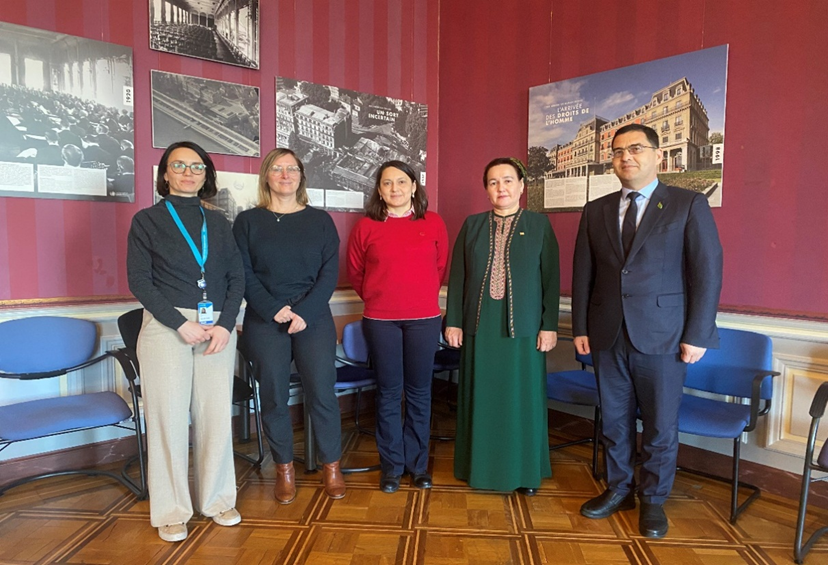
One of the important events of the Ombudsman’s work last year was the negotiations with members of the UN Committee on the Rights of the Child over an Alternative report on the implementation of the Convention on the Rights of the Child. To conduct these negotiations, from 6 to 10 February 2024, as part of the Annual Work Plan, the UNICEF in Turkmenistan organized a working visit of the Ombudsman of Turkmenistan to the Swiss Confederation. During the meeting, the Ombudsman of Turkmenistan informed the Committee members about the state of observance of children’s rights in Turkmenistan, the state policy of our state in the field of child and childhood protection, protection of their rights and interests, as well as the activities of the Ombudsman’s Office in this area. This was the first Alternative Report submitted by the Ombudsman to the relevant UN structures.
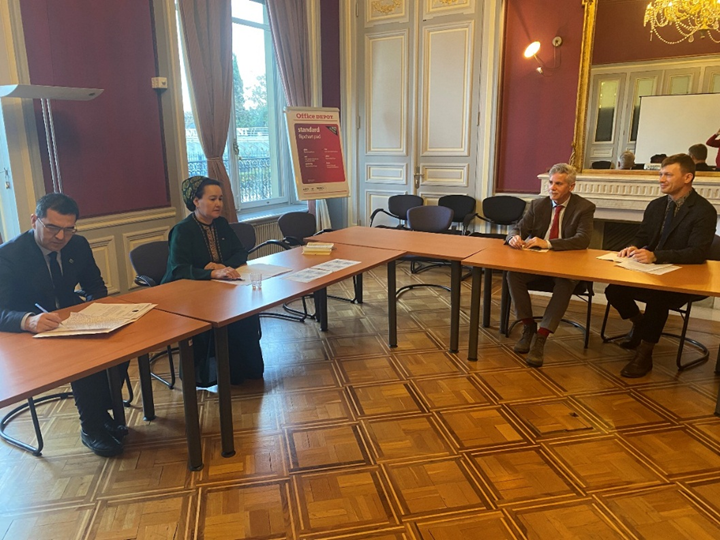
During the visit, meetings were held with representatives of the Regional Office of the UNICEF for Europe and Central Asia, the Office of the UNHCHR and the non-governmental organization “Child Rights Connect”. During these meetings, the Turkmen delegation was familiarized with the UN human rights entities, the work of certain UN committees and organizations and the activities of the NGO “Child Rights Connect”.
This visit of the Ombudsman became an important step toward the development of international cooperation between the Office of the Ombudsman of Turkmenistan, in particular, with the UN agencies.
During the year under review, the Office of the Ombudsman also established cooperation with the International Labour Organization (ILO) and held a number of joint events.
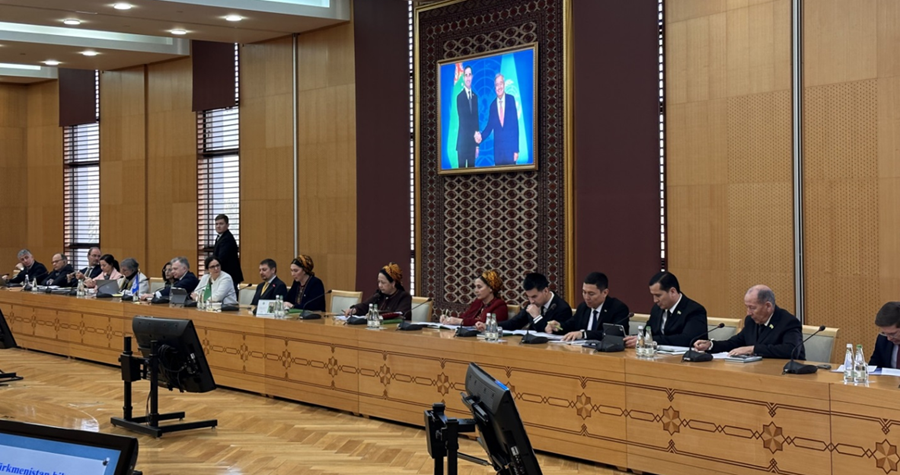
In February last year, the Ombudsman of Turkmenistan took part in an Inter-agency “round table” meeting with the participation of the ILO, headed by Assistant Director General, ILO Regional Director Beata Andres, to discuss the prospects for cooperation. During the confidential conversation, interactive discussions took place on the constructive resolution of issues related to ensuring decent work in various sectors of the economy of Turkmenistan. The meeting also discussed various aspects of cooperation between the ILO and the Government of Turkmenistan for the period of 2024-2025.
In addition, during the year, the Ombudsman of Turkmenistan participated in a number of specialized events in close cooperation with representatives of the ILO. In particular, in June of last year, the Ombudsman of Turkmenistan held an online meeting with a Specialist in international labour standards of the ILO institution, technical assistance on equal remuneration for Eastern Europe and Central Asia, Ms. Miranda Fajerman, and a Specialist in the Regional Representative of the UN OHCHR in Central Asia, Ms. Matilda Bogner.
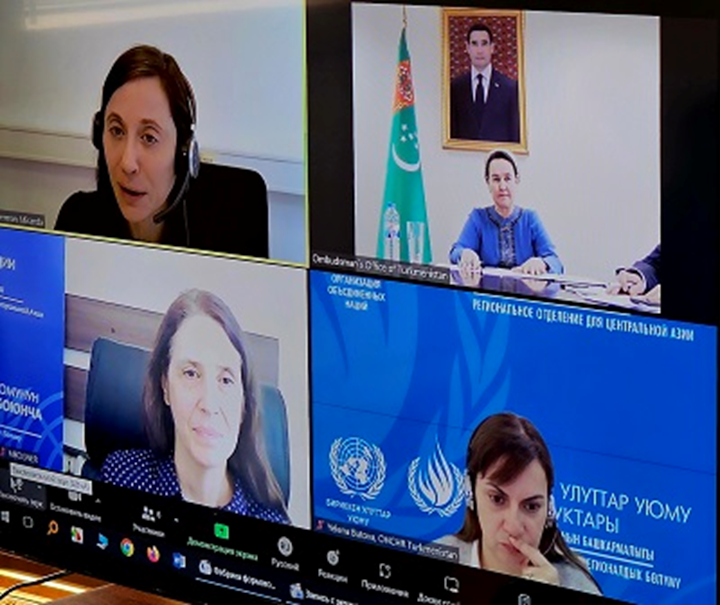
The meeting participants highly appreciated the activities of the Authorized representative for human rights as an independent institution for the protection of human rights in the country, including labour rights. The meeting sought promising areas and ways to develop bilateral cooperation.
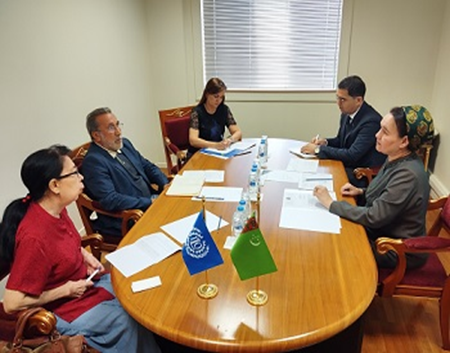 |
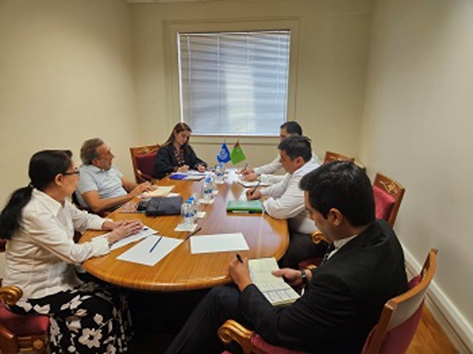 |
In July that year, the Ombudsman of Turkmenistan met with the international expert of the ILO, Manuel Roxo, who visited our country. The purpose of the international expert’s visit to our country was to assess the capacity of Turkmenistan’s state institutions, including the Office of the Ombudsman, to address complaints and appeals from citizens on labour rights issues. At the meeting, the parties discussed issues related to the implementation of tasks stipulated in the Roadmap for cooperation between the Government of Turkmenistan and the ILO for 2024-2025.
The international ILO experts also met with the staff of the Ombudsman’s Office to discuss issues of establishing systemic relations in the framework of further development of cooperation. During the meeting, it was noted that the Roadmap for cooperation between the Government of Turkmenistan and the ILO for 2024-2025 was the second comprehensive document identifying important areas of cooperation for the near future.
In addition to these events, a conference on the “Best practices in Developing seasonal worker recruitment programmes and protocols in accordance with ILO standards: The experience of Uzbekistan” was held with representatives of the Office of the Ombudsman, the Ministry of Labour and Social Protection of Turkmenistan, and the United States Agency for International Development (USAID) Programme on Safe Migration in Central Asia.
One of the main objectives of the Ombudsman of Turkmenistan is to ensure the protection of human and civil rights and freedoms guaranteed by the State, including monitoring the observance of the rights of girls and women. In this context, on 11-12 March 2024, a conference on gender-sensitive communication for government agencies and public associations of Turkmenistan was held in the city of Turkmenabat, Lebap region.
The conference for representatives of border regions, organized by the European Union's Border Management Assistance Programme in Central Asia (BOMCA) in cooperation with the Office of the Ombudsman of Turkmenistan, discussed legislative acts safeguarding equal rights for men and women, the activities and capacity of the State in their successful implementation and accumulated positive experience.
In April of 2024, a delegation of Turkmenistan headed by the Ombudsman of Turkmenistan took part in a Conference on the activities of the Ombudsman institutions of the Central Asian States, which was held in the Republic of Finland. The Council of Europe with the support of the Centre for the Rule of Law at the University of Helsinki and the Ministry of Justice of Finland organized it. At the conference, the Ombudsman of Turkmenistan together with the Ombudsmen of other Central Asian States, made presentations on the experience achieved in human rights.
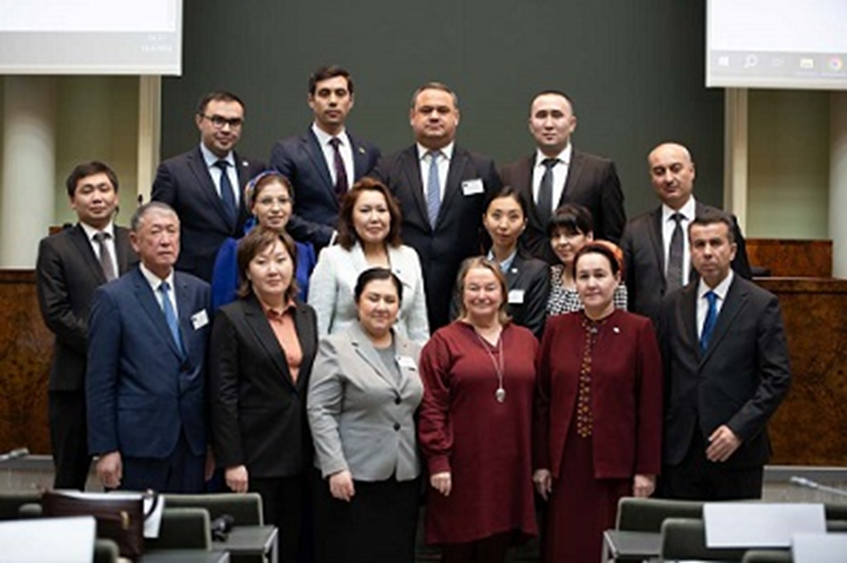
The Conference rendered a fruitful platform for a meaningful exchange of views between the Ombudsmen of the Central Asian States on the most important current issues of human rights protection and the establishment of effective cooperation between national human rights institutions.
Over the past year, the Ombudsman of Turkmenistan has participated in meetings of the Steering Committee for the Implementation of the Concept of Cooperation between Turkmenistan and the United Nations on Sustainable Development for 2021-2025, and the Turkmenistan-UN Strategic Advisory Council.
It should be noted that the Ombudsman participated in meetings of the Interagency Commission on Ensuring Turkmenistan’s compliance with international obligations on human rights and international humanitarian law, during which human rights issues were discussed. During one of these meetings, held in April 2024, issues related to strengthening the capacity of the Ombudsman’s Office, in particular, expanding its composition, and effectively establishing new areas of activity were considered. In accordance with the Decree of the President of Turkmenistan “On Improving the Activities of the Ombudsman’s Office” of 14 June 2024, new units were created within the Office, in particular, units for the protection of women’s and children’s rights, and for the protection of human rights in the private sector.
A special place in the development of international cooperation on human rights in the year under review is given to meetings of the Ombudsman of Turkmenistan with the governing bodies and representatives of the United Nations, the Organization for Security and Co-operation in Europe, the European Union and the member States of the European Union.
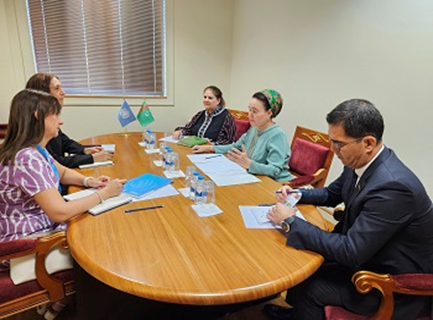 |
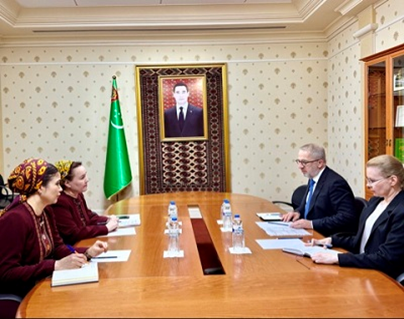 |
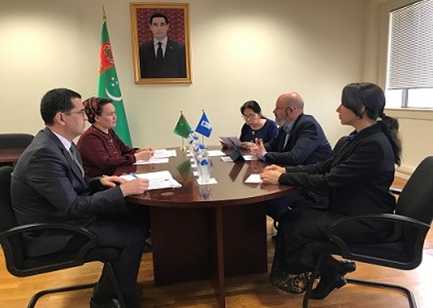 |
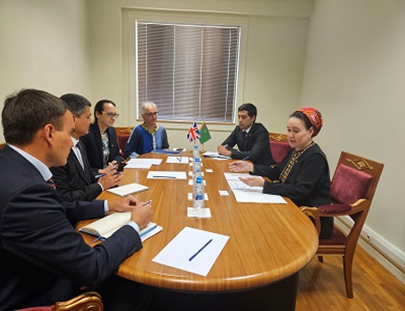 |
Among the significant events, meetings should be mentioned with the UNDP Acting Permanent Representative in Turkmenistan, Mr. Tomica Paovich, the representative of the UNICEF in Turkmenistan, Mr. Mohammad Fayazi, who was completing his mission in Turkmenistan, and with the Regional Representative of the Office of the UNHCHR in Central Asia, Ms. Matilda Bogner, the delegation of the European Union headed by the EU Special Representative for Human Rights, Mr. Olof Skoog, the Human Rights Adviser to the United Nations Treaty Bodies, Office of the United Nations High Commissioner for Human Rights, Mr. Artur Jacevich, the Head of the Department of Regional Development of the Ministry of Foreign Affairs of the Commonwealth and Development of Great Britain, Ms. Sarah Cooper, the delegation of the European Union led by the EU Special Representative for Central Asia, Ms. Teri Hakala, the delegation led by the Ambassador-at-Large of the U.S. Department of State Office for Monitoring and Combating Human Trafficking Cindy Daera, the First Deputy Public Defender of Georgia Ms. Tamar Gvaramadze, the Vice-President of the European Bank for Reconstruction and Development, Senior Political Adviser Mr. David Lewis, representative of the United States Agency for International Development in Turkmenistan Mr. Jeffrey Skarin, and Jalpa Ratna, Head of the UNICEF Office, who was taking up her duties in our country.
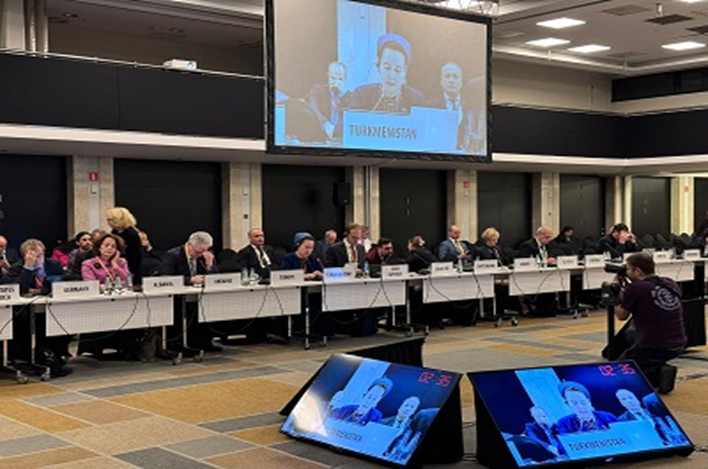
In addition to these meetings, during the period under review, the Office of the Ombudsman continued to cooperate with the SCA of the GANHRI. As a result, as was already noted in the previous Chapters of the report, the Office of the Ombudsman of Turkmenistan was assigned the legal status “B”. The Office as the holder of this status confirms its commitment to further cooperation with relevant international organizations in order to strengthen the capacity of the Office, bring it in line with the Paris Principles and achieve the highest legal status “A”.
In October 2024, the Ombudsman of Turkmenistan, as part of the state delegation, took part in the work of the OSCE/ODIHR Warsaw Conference on the Human Dimension (Republic of Poland). One of the sessions was devoted to humanitarian issues and the development of democratic institutions. The Ombudsman explained in detail the achievements of the State policy in human rights in Turkmenistan, including measures to eliminate statelessness, which is an expression of humanism as such. The speech also highlighted leveraging the ongoing work to support democratic institutions, in particular, the measures taken to strengthen the institutional capacity of the Office of the Ombudsman of Turkmenistan.
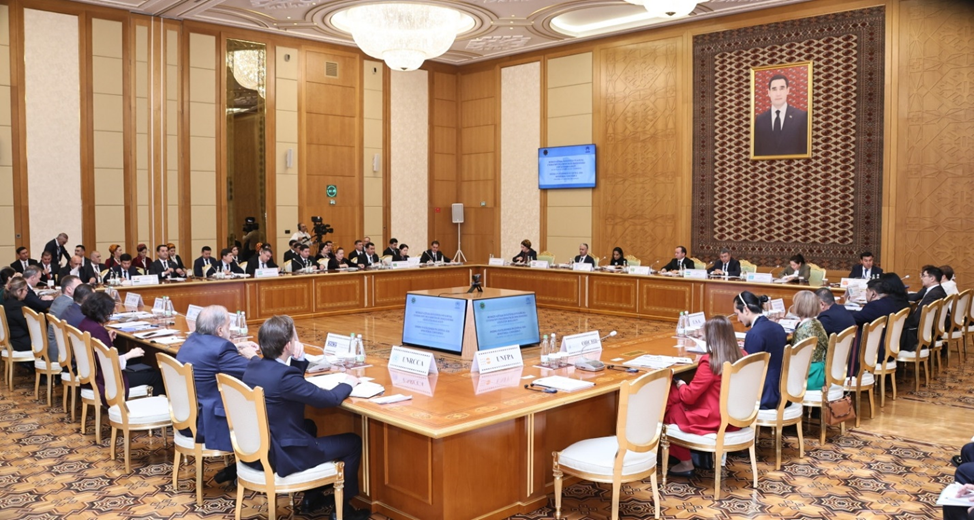
The participation of the Ombudsman in the Regional Ministerial Conference on the Eradication of Statelessness in Central Asian Countries, held on 8 November 2024 in Ashgabat, was a significant activity. The annual direct participation of the Ombudsman in the ceremonies of handing over civil passports and residence permits should be noted herewith. During the conference, Turkmenistan was recognized as the country that put an end to statelessness, as testament of the commitment to the fundamental principles of humane, democratic and modern legal development.
The National Action Plan for the Elimination of Statelessness in Turkmenistan for 2019-2024 has been approved and successfully implemented. In recent years, 32,144 people have been granted citizenship of Turkmenistan, and another 5,152 people have received a residence permit in Turkmenistan.
In the year under review, measures to strengthen the capacity of the Office of the Ombudsman were carried out primarily within the framework of the project “Enhancing the institutional capacity of the Office of the Ombudsman of Turkmenistan”, initiated and signed by the Office of the Ombudsman and the UNDP Representative Office in Turkmenistan. Within the framework of the project, workshops on the legitimate powers of the Ombudsman were held in the capital and regional centres of the country, in line with the principles of interaction between national human rights institutions, government agencies and public associations and compliance with the Paris Principles.
In December last year, within the framework of the project “Enhancing the institutional capacity of the Ombudsman’s Office”, a meeting of the Project Council was held with the participation of Narine Sahakyan, the UNDP Permanent Representative in Turkmenistan. During the meeting, the outcomes of the work carried out within the project in 2024 were summed up, and further steps were discussed.
In particular, based on the assignment of the legal status “B” to the Ombudsman’s Office, discussions were held in cooperation with international organizations such as the GANHRI and the APF on expanding the legal powers of the Ombudsman as a national human rights organization and strengthening its work in accordance with the Paris Principles.
As part of the work over the year under review, it is important to note the active participation of the Ombudsman and staff in consultations with representatives of international organizations and countries, who work fruitfully on protection of human rights, gave an additional impetus to the effective promotion of human rights and the exchange of positive experiences.
Such events included a seminar organized by the UNICEF in Turkmenistan, with the participation of staff from the Ombudsman’s Office, on the importance of assessments and strategic planning to improve policies and programmes for the implementation of the SDGs and the human rights agenda. International UNICEF experts Saltanat Rasulova and Natalia Kosheleva attended the conference.
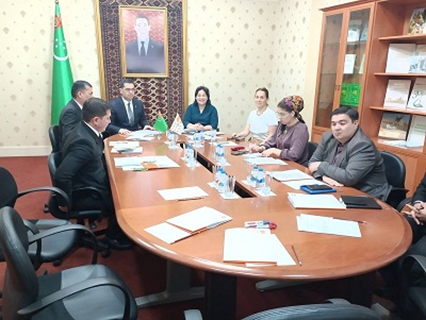 |
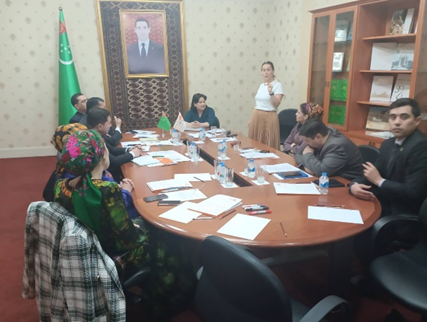 |
On 18-20 March last year, a seminar was held at the Office of the Ombudsman of Turkmenistan with the participation of the international consultant of the United Nations Population Fund (UNFPA), Ms. Yanina Arsenyeva. The agenda included issues of women’s reproductive rights, discussed various aspects of the provision of reproductive health services to persons with disabilities, and compliance with international law by institutions and organizations in the provision of reproductive health services.
On 3 April 2024, within the framework of Turkmenistan’s cooperation with the United Nations, a regular meeting of the Joint Groups on the results of the Sustainable Development Cooperation Framework between Turkmenistan and the United Nations for 2021-2025, was held. During the meeting, joint activities for 2024 were discussed.
Representatives of the Ombudsman’s Office also regularly participated in events organized by the OSCE Centre in Ashgabat. On 15 April 2024, a hybrid format conference on “OSCE Best Practices in the Establishment and Operation of the Institute of Business Ombudsman” was held at the OSCE Centre in Ashgabat within the framework of the organization’s project “Strengthening Economic Development” with the participation of international expert Mirshod Nasullayev. The aim of the event was to study international experience and development goals, including the role of the Ombudsman in supporting SMEs.
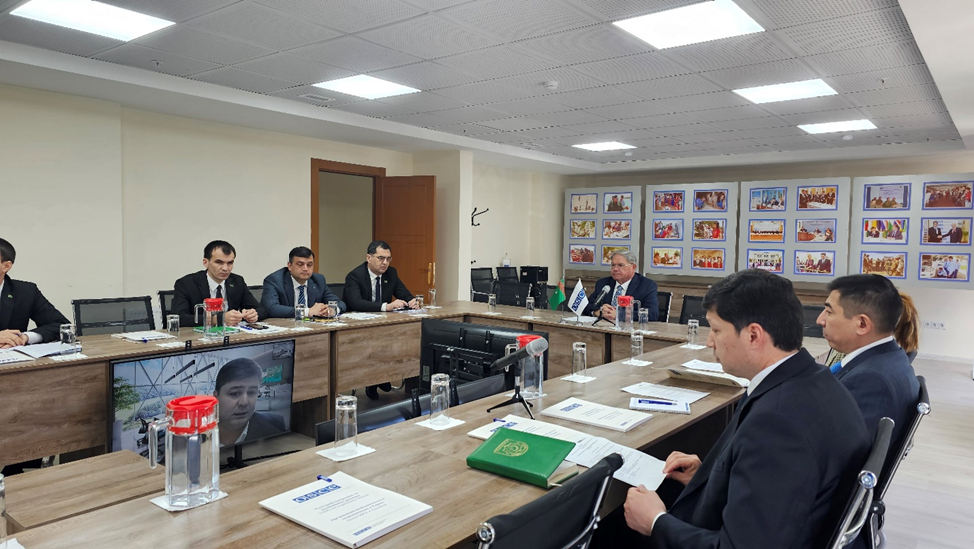
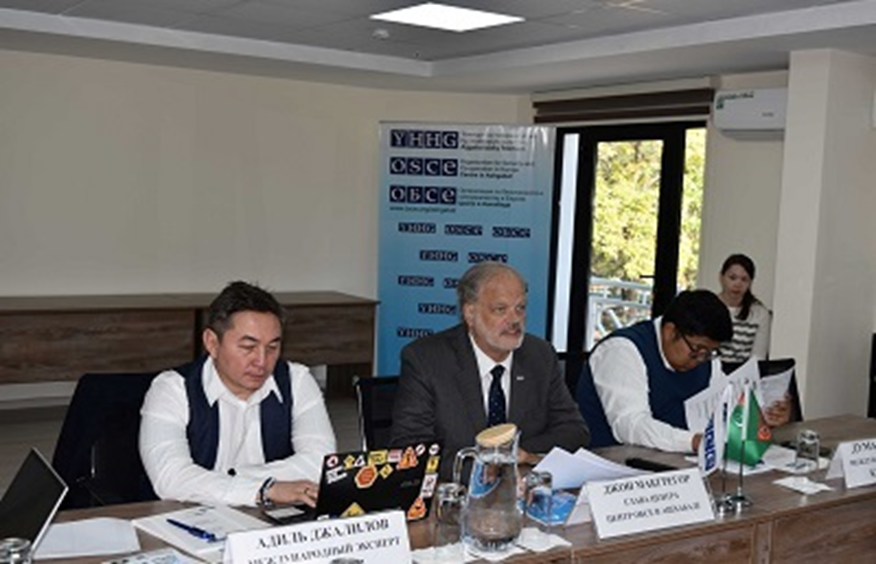
In addition, within the framework of the OSCE Centre in Ashgabat project on “Promoting the implementation of international legal standards and reforms in the penitentiary system of Turkmenistan”, representatives of the Ombudsman’s Office participated in a conference with international experts from Kyrgyzstan, the Netherlands and Germany, where they were introduced to the best practices gained in this area.
During the year, a number of videoconferences were organized jointly with human rights international organizations and representative offices of countries engaged in human rights agenda around the world.
On 17 April last year, representatives of the Ombudsman’s Office took part in a seminar on the protection of human rights in the digital environment, organized by videoconference by the Office of the Authorised Representative for Human Rights of the Russian Federation in cooperation with the Scientific and Educational Centre for Human Rights of O. E. Kutafin University (MGUA).
The seminar, which was attended by representatives of NHRIs of Azerbaijan, Kazakhstan, Kyrgyzstan, Tajikistan, Turkmenistan, Uzbekistan and other Eurasian states, highlighted the important role of developing cooperation and sharing positive experiences between NHRIs in various areas of human rights.
In the year under review, representatives of the Ombudsman’s Office actively participated in meetings to review the implementation at the national level of the Beijing Declaration adopted at the 4th World Conference on Women and the Platform for Action to discuss the CEDAW Final Recommendations, based on the results of the Sustainable Development Cooperation Framework between Turkmenistan and the United Nations and the final comments of the UN Committee on the Rights of the Child on the country’s next report.
The protection of children’s rights is one of the priority vectors of the Ombudsman’s activities. Along with the ongoing activities of the Ombudsman’s Office planned according to the Annual Work Plan, participation in activities for child rights protection was ensured. These included the UNICEF Global Online Course on Mental Health and Psychosocial Support for Children and Local Caregivers in Difficult Life Situations, including emergencies. The course started on 13 May 2024 and lasted until 17 June 2024.
Among the significant events, the Central Asian thematic Conference on “Ensuring Birth Registration in order to prevent Statelessness”, organized by the UNHCR Office in Central Asia, which took place on 17 May 2024 should be noted.
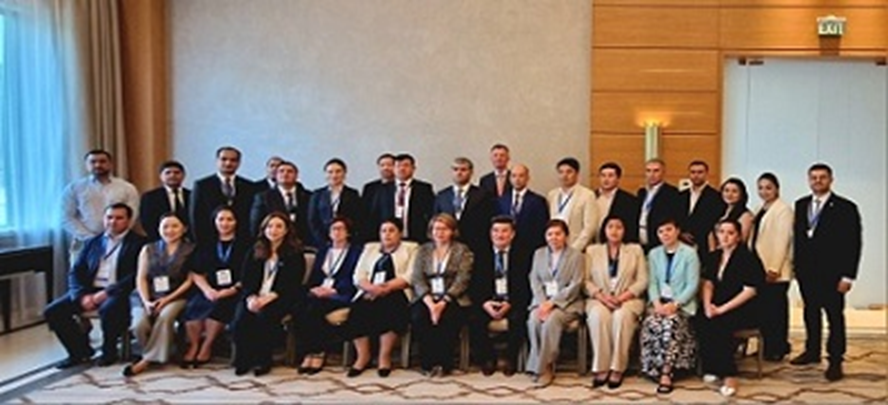
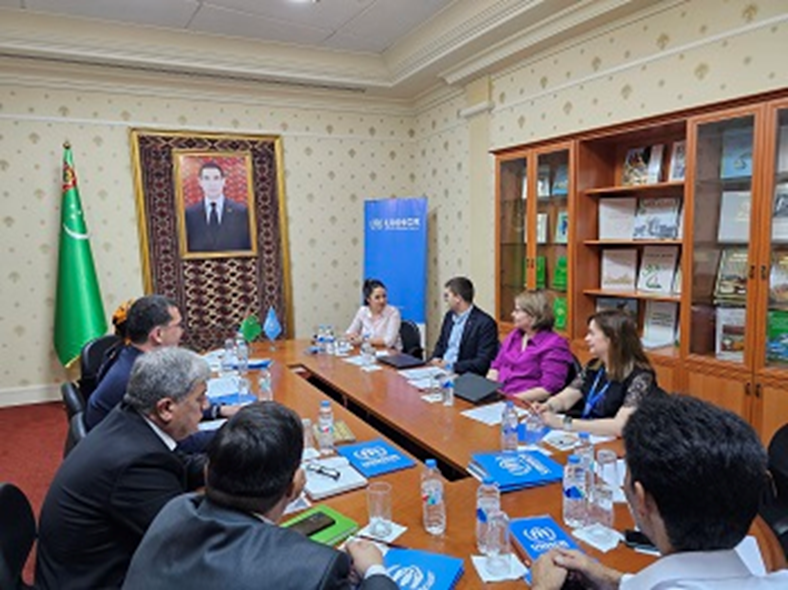
In May last year, a seminar on identifying socially vulnerable people in places of detention and at borders was organized and held for staff of the Office of the Ombudsman of Turkmenistan under the auspices of the UNHCR.
The seminar was conducted by the UNHCR Senior Protection Adviser, Ms. Rano Saidumarova, the UNHCR Statelessness Adviser in Central Asia, Mr. Sergey Gaina, and the UNHCR Legal Adviser, Ms. Hanifa Karimi. The aim of the seminar was to strengthen the capacity of the staff of the Office of the Ombudsman of Turkmenistan to identify and assess the situation of vulnerable groups, forcibly displaced persons and stateless persons in places of detention and at borders.
In early July of the reporting year, representatives of the Ombudsman’s Office participated in a specialized online course for government officials of Turkmenistan on the topic “Comprehensive Gender Mainstreaming”. Within the framework of the event, training modules were organized on the importance of the work of civil servants in observing human rights, protecting the rights and dignity of citizens, improving the awareness of civil servants in this area through a specialized website.
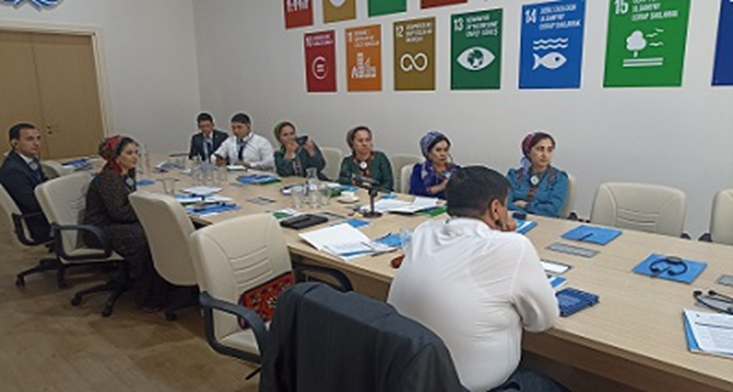
On 3-5 September 2024, the staff of the Ombudsman’s Office participated in the thematic seminar “International Principles of Observance of economic, social and cultural rights with a focus on labour rights”. The event was organized by the Regional Office of the UNHCHR in cooperation with the ILO, with the participation of Ms. Jung Rin Kim and Ms. Harumi Fuentos, experts from the Department of Economic, Social and Cultural Rights of the Office of UNHCHR and a specialist in international labour standards and labour rights of the ILO Ms. Miranda Fajerman.
At the end of October 2024, a representative of the Ombudsman’s Office took part in the 15th International Scientific Conference “Administrative Law and Practice, Current Status and Challenges for the Future”, organized by the GIZ Office in Astana (Republic of Kazakhstan). The forum discussed topical issues of improving administrative legislation in a market economy, with a strong focus on modernizing administrative relations through the digitalization of public service delivery systems to citizens.
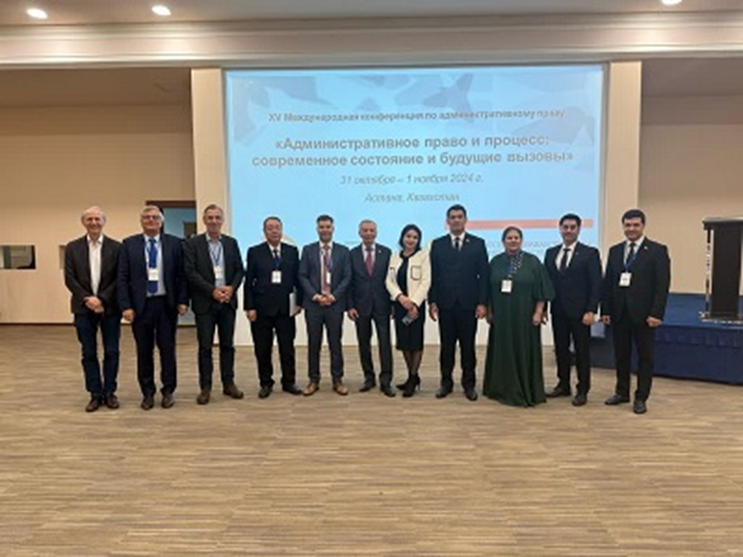
The development and strengthening of mechanisms for the promotion and protection of human rights is the key activity of the Ombudsman of Turkmenistan. An additional incentive for the successful implementation of this task is to improve procedures for reviewing citizens’ complaints, interact with government agencies and public associations concerned to further strengthen human rights protection, study in detail cases of human rights violations, consistently publish thematic information on significant human rights issues, and conduct targeted monitoring.
Among the objectives outlined in the Strategic Plan of the Office of the Ombudsman of Turkmenistan for 2024-2028 was the improvement of procedures for filing complaints of human rights violations by increasing the number of appeals and improving their submission methods.
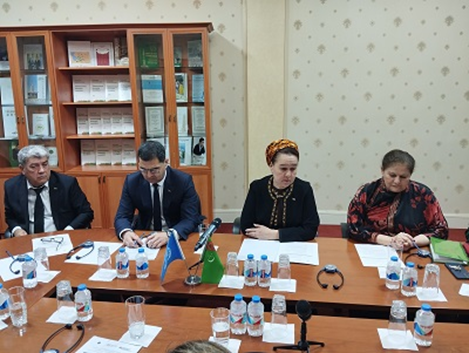 |
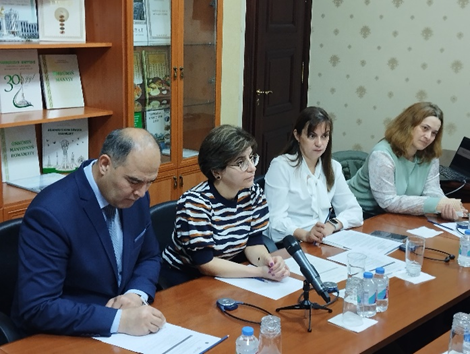 |
At the end of the reporting year, a number of thematic events were held. On 5-7 November, the Office of the Ombudsman hosted a conference on “International Practice of effective complaint review mechanisms for NHRIs” with the participation of Tamar Gvaramadze, Deputy Public Defender of Georgia, and Natalia Uteshova, international expert of the OHCHR. The conference heard reports on the functions of NHRIs, methods of handling complaints in accordance with the requirements of the Paris Principles, audit methodology, and mechanisms of the Public Defender in Georgia in handling incoming complaints and appeals.
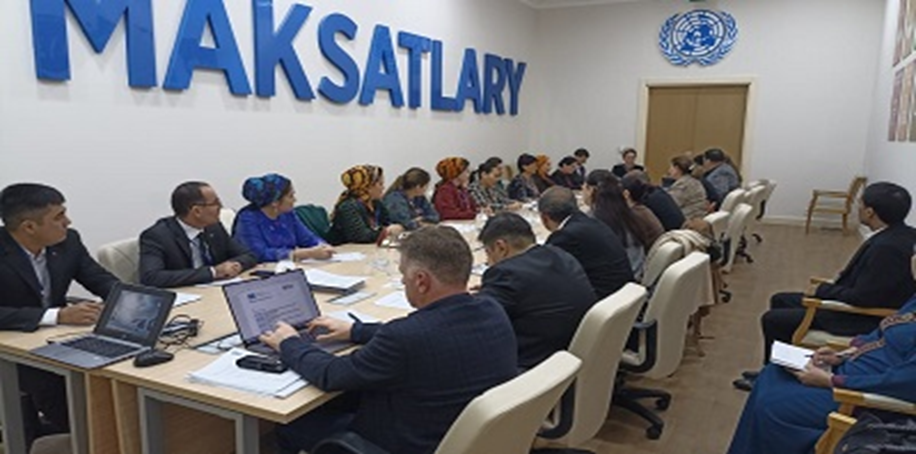
On 27-28 November a conference was held, organized by UNDP experts together with the Office of the Ombudsman, dedicated to improving the mechanism for receiving and reviewing complaints. The international expert of this organization, Georgy Tugushi, attended the conference.
In addition, within the framework of cooperation with the Representative Office of the IOM in Turkmenistan, representatives of the Ombudsman’s Office participated in joint meetings dedicated to discussing the draft National Action Plan of Turkmenistan on combating Human Trafficking for 2025-2029.
The active participation of the Ombudsman of Turkmenistan and representatives of the Ombudsman’s Office in seminars, conferences, and “round tables” on various aspects of human rights protection contributed to the improvement of their knowledge and expertise in this field.
The review of the activities of the Office of the Ombudsman of Turkmenistan in the area of international relations over the reporting year demonstrates the constant focus on further strengthening of peace and friendship between peoples and States, expanding relations with human rights international organizations within the framework of universally recognized norms of international law at the current stage of the Revival in a new era of a powerful state. This fact testifies to Turkmenistan’s continued commitment to international obligations to consistently respect human rights as a full-fledged member of the international community.
Based on the above, in order to further improve activities in the field of ensuring and protecting human rights in the country at the level of universally recognized international standards, it is proposed to:
Chapter VIII. Inquiries and recommendations of the Ombudsman
One of the main powers and functions of the Ombudsman provided for in Articles 18 and 19 of the Law of Turkmenistan “On the Ombudsman” is to consider complaints from citizens of Turkmenistan, regardless of their residence in or outside Turkmenistan, foreign citizens and stateless persons residing in Turkmenistan. The rules on the cases, timing, procedure and content of citizens’ appeals to the Ombudsman, the rules on the rights and duties of the Ombudsman in seeking assistance in restoring violated human and civil rights and freedoms, are specified in Articles 28 and 29 of the Law of Turkmenistan “On the Ombudsman”.
In this chapter of the Report, the issues of the Ombudsman’s inquiries within the limits of her powers will be touched upon in accordance with Article 27 of the Law of Turkmenistan “On the Ombudsman” to authorized state bodies and local self-government bodies, relevant officials of assistance in carrying out inspections of complaints and applications accepted by citizens, the Ombudsman’s appeals to institutions, enterprises and organizations, or to their officials for the immediate restoration of the violated human and civil rights and freedoms confirmed on the basis of Article 30 of the Law, appeals to the relevant authorities for the provision of necessary documents on the basis of paragraph 2, first part of Article 18 of the Law and related complaints and appeals of citizens, and other cases of the Ombudsman’s appeal to the relevant authorities, not related to with complaints from citizens.
Similarly to the IV chapter of the Report devoted to the analysis of complaints and appeals, the examples below will indicate some of the results satisfied in the year under review, obtained from 104 inquiries of the Ombudsman made on the basis of Article 27 of the Law “On the Ombudsman”, 5 proposals made on the basis of Article 30 of the Law, 14 inquiries considered on the basis of documents received in accordance with paragraph 2 of the first part of Article 18 of the Law and 11 sent according to the affiliation of the appeals.
According to the Constitution of Turkmenistan and the Law of Turkmenistan “On Education”, every person living in Turkmenistan has the right to education, and this right is considered one of the basic and inalienable constitutional human rights. In one of the appeals submitted to the Office of the Ombudsman on behalf of a resident of Ashgabat, K.J., it was noted that his daughter, born in 2018, who was due to start first grade in 2024, was not accepted into a specialized school in Ashgabat, and therefore asked for assistance in resolving this issue. This appeal was registered with the Office of the Ombudsman, and based on Article 27 of the Law of Turkmenistan “On the Ombudsman”, the Ministry of Education of Turkmenistan was instructed to conduct an appropriate inspection and report on its results. As a result of consideration of the Ombudsman’s request, it was reported that K.J.’s daughter was accepted into the 1st grade of a specialized secondary school in Ashgabat.
Despite the fact that the first part of Article 111 of the Labour Code of Turkmenistan legally establishes that an employer, regardless of his financial condition, is obliged to pay an employee for the work performed in accordance with the established conditions and terms of remuneration, some appeals accepted for handling by the Office of the Ombudsman indicated non-compliance with this requirement of the law. The following examples show how, as a result of the work carried out by the Ombudsman, these requirements of the law were fulfilled.
For example, a resident of Ahal region, Sh. G., appealed to the Office of the Ombudsman with a complaint about the incomplete payment of wages for 2022-2024 and asked for assistance in resolving this issue. His application was registered with the Office of the Ombudsman and, on the basis of paragraph 2 of the first part of Article 18 of the Law of Turkmenistan “On the Ombudsman”, relevant documents were requested and received from his place of work, upon examination of which incomplete payment of wages for the period 2022-2024 was established. As a result of consideration of the Ombudsman’s appeal to the hyakimlik/ municipality of Ahal Velayat, a response was received on the transfer of wages based on a corresponding payment order to Sh. G.’s wage card in the amount of 18 028 and 38 053 manats and informed of the transfer of the remaining amount in the amount of 13 932 manats from the profits to be received based on the results of the cotton harvest in 2024.
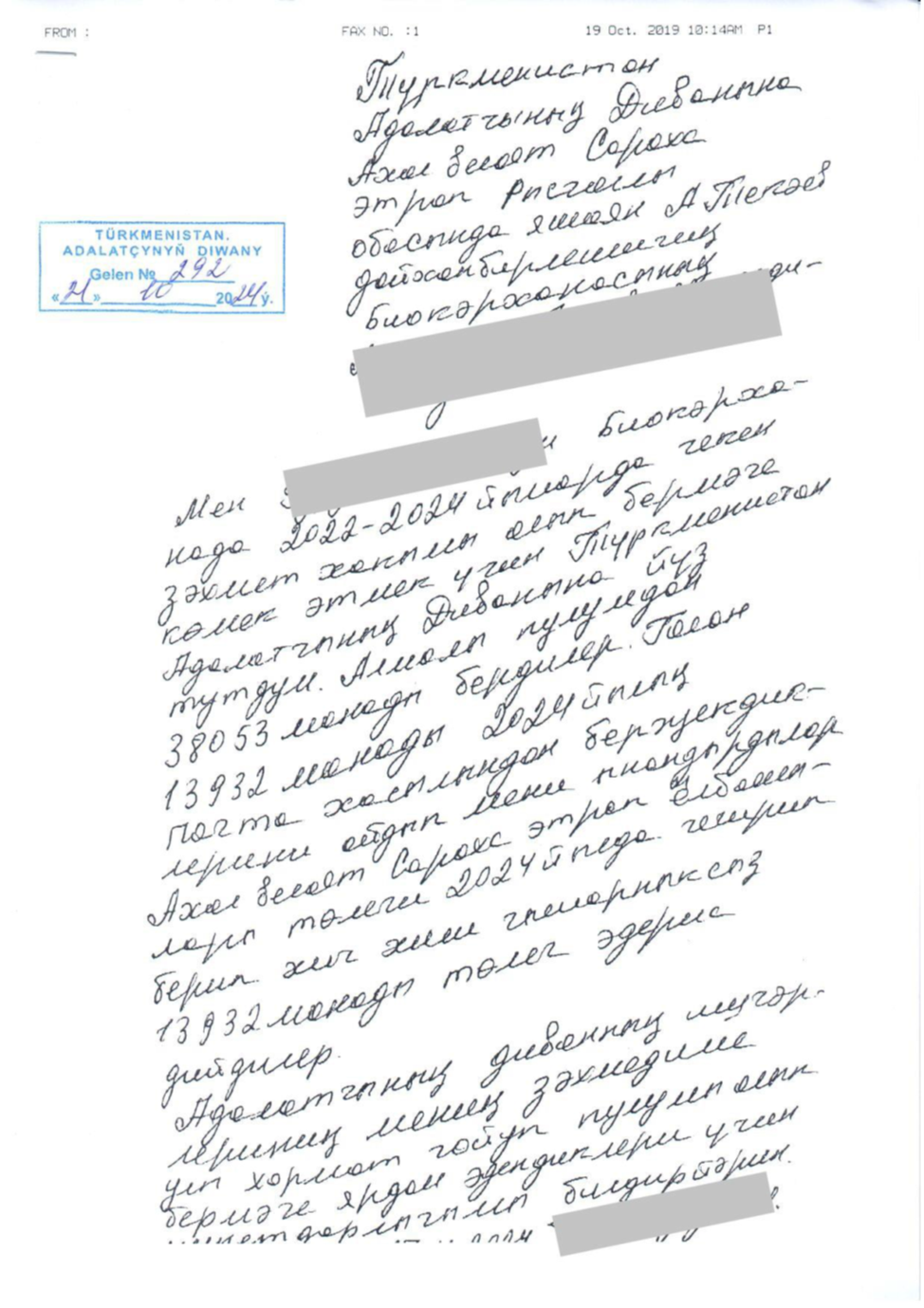
To the Office of the Ombudsman of Turkmenistan
from an employee of the Biological enterprise,
Farmers’s association named after A.Tekayev in the
village of Rysgally
The Serahs district, Ahal region
I have addressed the Office of the Ombudsman of Turkmenistan with a request to assist in obtaining salaries for work at the bio-enterprise in 2022-2024. I was given 38,053 manats of the amount due, and the remaining amount of 13,932 manats is promised to be paid out of profits based on the results of the cotton harvest in 2024. The heads of the Serahs district assured me that the remaining amount of 23,932 manats would be paid in 2024, and I am satisfied. I would like to thank the staff of the Ombudsman’s Office for showing respect for my work and helping me receive my salary.
The Ombudsman’s Office registered a collective appeal from residents of the Lebap region A.A. and others for assistance in obtaining wages, which, based on Article 27 of the Law of Turkmenistan “On the Ombudsman”, was forwarded by the Ombudsman to the Ministry of Agriculture of Turkmenistan for verification. As a result of consideration of the issue raised in the appeal, the Ministry of Agriculture of Turkmenistan informed that in accordance with the decree of the President of Turkmenistan “On Payment of expenses from the Special Purpose Account of the Ministry of Agriculture of Turkmenistan” of 3 November 2024, a payment was made to specialized breeding farms of Dayhan associations to finance expenses in 2023, from which it was planned to pay wages to A.A. and other applicants.
In some appeals received by the Office of the Ombudsman, it was noted that the rights of citizens were not enforced even in simple indisputable matters. In other words, it turned out that there were cases when people encountered obstacles in obtaining the necessary documents from government agencies, and their complaints to government agencies remained unanswered. The Ombudsman’s work on such statements resulted in positive solutions to the problems indicated in the appeals.
The Office of the Ombudsman registered a statement from a resident of Ashgabat, N.A., expressing dissatisfaction with the lack of response to his written appeal to the hyakimlik of Ashgabat with a request for assistance in resolving an issue. As a result of consideration of the Ombudsman’s inquiry to the hyakimlik based on Article 27 of the Law of Turkmenistan “On the Ombudsman”, N.A. was given a certified copy of the purchase and sale agreement along with a response to the appeal.
Another example was the appeal of a resident of Mary region, A.Y., for assistance in obtaining an extract from the land registry stored in the Department of Land Resources of Mary, which was registered with the Ombudsman’s Office and addressed in accordance with Article 27 of the Law of Turkmenistan “On the Ombudsman”. As a result of the consideration of the appeal by the hyakimlik of Mary region, a response was received on the issuance to citizen A.Y. of an extract from the land registry stored in the Department of Land Resources of Mary, on the registration of a 0.16 ha land plot allocated to the deceased father of the applicant and on the satisfactory resolution of the issue raised.
In accordance with Article 33 of the Labour Code of Turkmenistan, the transfer of an employee to another permanent job at the same enterprise on the initiative of the employer or a change of place of work is allowed only with the written consent of the employee. Failure by the employer to comply with this requirement of the Law based on applications from citizens entails the cancellation of accepted orders. The example below is evidence of this.
The Office of the Ombudsman has registered an appeal from residents of Dashoguz region V.N. and others complaining about changing jobs without their consent because they were women. This appeal has been sent to the General Prosecutor’s Office of Turkmenistan on the basis of Article 27 of the Law of Turkmenistan “On the Ombudsman”. As a result of an inspection carried out by the Prosecutor General’s Office of Turkmenistan at the request of the Ombudsman, it was established that citizen V.N. and others, on the basis of Order No. 196-IŞ dated 3 September 2024, in violation of the law, were transferred to the position of hospital landscaping workers. The Order No. 247 of 16 October 2024 canceled the previous order. VN and other female employees were transferred to their previous jobs.
In some applications submitted to the Office of the Ombudsman, citizens complained of inaction against those who had committed crimes and asked for assistance in resolving such issues. As a result of the review by the authorized bodies of the appeals forwarded them by the Ombudsman, some of them were satisfied, which is reflected in the following examples.
Z.M., a resident of Dashoguz region, complained about the non-criminalization of O.S., a citizen who had driven his daughter, G.R., to suicide by violent acts against her and asked for assistance in resolving this issue. The Ombudsman’s Office registered this appeal and, based on Article 27 of the Law of Turkmenistan “On the Ombudsman”, the Ombudsman appealed to the Prosecutor General’s Office of Turkmenistan for assistance in verification. As a result, it was reported that upon the death of a citizen born in 2003, by self-hanging, the Prosecutor’s office of Akdepe district conducted an inspection based on Articles 214 and 215 of the Criminal Procedure Code of Turkmenistan. On 28 November 2024, a criminal case was opened against citizen O.S. under part two of Article 106 of the Criminal Code of Turkmenistan (driving to suicide), charges were brought, a preventive measure - detention was chosen, and that investigative actions continued.
The Office of the Ombudsman registered a collective statement from residents of Mary region S.M. and others about conducting a criminal case against the Director of school No. 20 in Mary and his Deputy for a long time because of their illegal actions in the field of education and the failure to take any measures against them. The Ombudsman, in accordance with Article 27 of the Law of Turkmenistan “On the Ombudsman”, forwarded this appeal and inquiry to the Prosecutor General of Turkmenistan for assistance in conducting verification. When clarifying the issues raised in the application, the Mary city Prosecutor’s office conducted investigative actions based on Articles 214 and 215 of the Criminal Procedure Code of Turkmenistan. It was established and reported that the Director of the above-mentioned school since 1 September 2017, and citizen O.A., working as Deputy Director of the Administrative arm since 9 September 2020, despite Russian teacher A.K. did not actually teach, in the period January-February 2024, they filled out a fake document stating that she taught 12 hours of Russian lessons and received 2,707 manats from her. They received various sums of money from the teachers of this school A.A., E.A. and A.V. as well. Despite the fact that K.A.’s actions had signs of crimes provided for in part one of Article 203, part two of Article 250 of the Criminal Code, and O.A.’s actions had signs of acts provided for in part one of Article 203, part two of Article 250, Article 206, given the commission of these actions for the first time and the termination of public danger of their acts, by the resolution of the Mary City Prosecutor’s Office of 18 September 2024 the criminal case proceedings were denied, on the basis of part two of Article 218 of the Criminal Procedure Code of Turkmenistan. By Order No. 156 &2 of 4 September 2024 of the General Directorate of Education of the Mary region K.O., and by Order No. 165 &2 of 18 September 2024. O.A. were dismissed on their own accord pursuant to the first part of Article 41 of the Labour Code of Turkmenistan.
Despite the fact that chapter 9 of the Housing Code of Turkmenistan establishes advantages for orphans left without parental care in resolving their housing issues regarding their registration and queuing, one of the applications registered with the Office of the Ombudsman revealed a violation by the local executive authority of this requirement of the Law. Through the intervention of the Ombudsman and verification conducted by the authorized body, the violated right was restored.
The Ombudsman’s Office has registered a statement from a resident of Ashgabat, A.D., asking for assistance in resolving the housing issue, as she was in need of housing. This application, based on Article 27 of the Law of Turkmenistan “On the Ombudsman”, was sent to the General Prosecutor’s Office of Turkmenistan, which conducted verification. During verification, it was established that despite the fact that, in accordance with paragraph 11 of the first part of Article 68 of the Housing Code of Turkmenistan, orphaned children who lost both parents have the right to receive housing from the state housing fund as a priority, citizen A.D.’s application for housing in the hyakimlik of the Berkarar district of Ashgabat, submitted upon her starting to live on her own in 2024, was wrongly registered as in need of improving housing conditions, whereas her parents were not known and she had been raised in an orphanage since childhood. According to the results of verification, it was reported that the Prosecutor’s office of the Berkarlyk district issued an Order to the above-mentioned hyakimlik about the elimination of violations in this matter.
Positive outcomes were achieved in the resolution by the Ombudsman’s Office of issues raised by citizens about the insufficient performance of tasks assigned to local executive authorities by the Law of Turkmenistan “On Local Executive Authorities” and related grievances.
A collective complaint by A.S. and others living in Dashoguz region requesting assistance in the normal functioning of electricity supply in their places of residence, registered with the Office of the Ombudsman, was sent to the hyakimlik of Dashoguz region for verification in accordance with Article 27 of the Law of Turkmenistan “On the Ombudsman”. During verification, it was confirmed that the Bedew street in Ogshuk Gengeshlik, Diyar village, Sayat district, which is the place of residence of the applicants, was not properly provided with electricity. The need for reconstruction of electrical wiring was established, and as a result, the “Electric Grid” of Shabat district replaced the transformer providing this street with electricity on Transformer-630, the relevant repairs were done, resulting in providing the applicants with proper energy supply.
A collective appeal from residents of the city of Ashgabat, J.J. and others, for assistance in the normal functioning of the central sewage supply running along the 2255 (Oraz Annayev) Street, providing their houses, was registered with the Office of the Ombudsman. Pursuant to Article 27 of the Law of Turkmenistan “On the Ombudsman”, an appeal was made for an inspection to hyakimlik of the city of Ashgabat. The employees of the Production Department of the Sewerage Department of the Aşgabatagyzsuw Association of the Hyakimlik Municipal Administration of the city of Ashgabat, based on the appeal carried out an inspection at the specified address. The formation of debris that blocked the sewer system was established, appropriate cleaning work was carried out and the proper operation of the sewer system was restored.
It can be seen from the above that citizens apply to the Ombudsman with various issues. One of these statements sets out a request for the Ombudsman’s assistance in resolving the issue, according to which, despite the termination of the contract for the construction of an apartment building at the expense of citizens, the developer does not fulfill the conditions stipulated in the contract. The results of the Ombudsman’s review of this application are given in the example below.
The Office of the Ombudsman registered an appeal from a resident of the Balkan region, Y.D., who signed an agreement with the Zerger Demirbetonönümleri plant for the construction of a residential apartment at the address House No 30, apartment 13, which was being built in a four-story 36-apartment building in the residential complex Nebitçi 1. In accordance with the terms of the contract, despite the fact that construction had not been completed and the contract had been terminated, the developer did not refund the initial contribution of 10% of the total cost of the apartment, amounting to 180,000 manats. Based on this complaint, the Ombudsman, on the basis of Article 27 of the Law of Turkmenistan “On the Ombudsman”, applied to the Ministry of Civil Engineering and Architecture of Turkmenistan for assistance in conducting an audit. As a result of the audit conducted by the Ministry, the specified amount was returned to citizen Y.D. at the expense of the Zerger Demirbetonönümleri plant, which was reported to the Ombudsman’s Office.
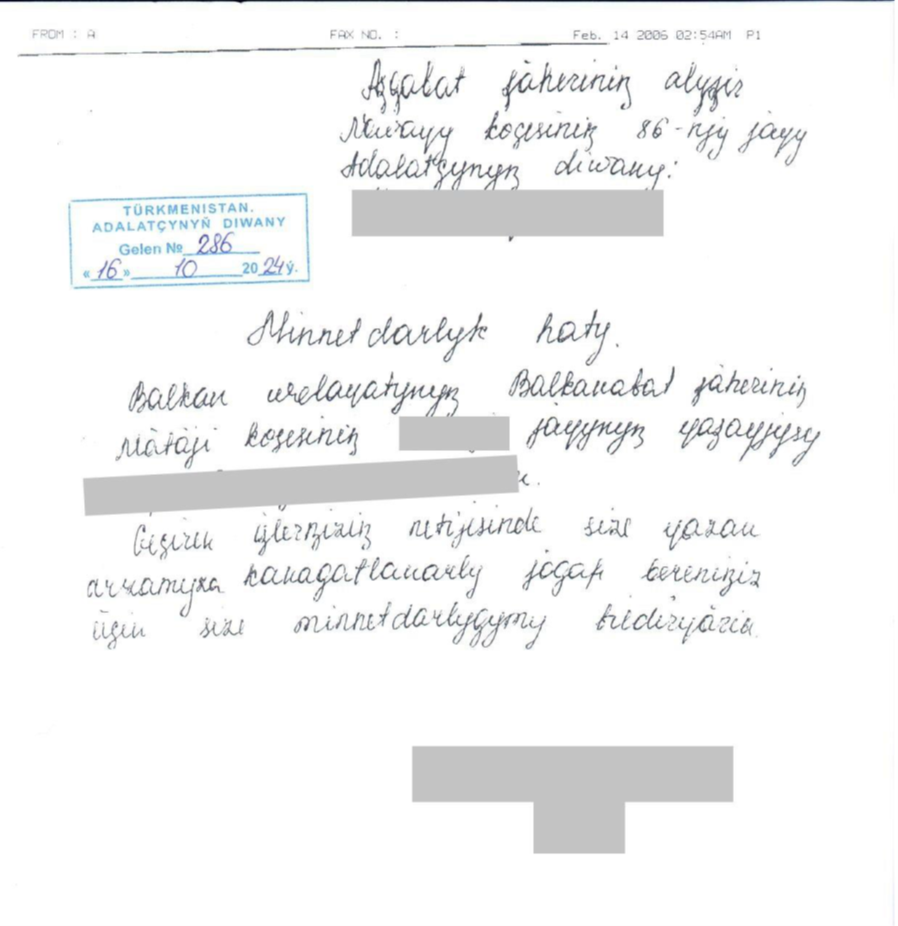
Office of the Ombudsman of Turkmenistan,
86 Navoi Street, Ashgabat
Letter of thanks
I, a resident of apartment __, house __, Myataji street, city of Balkanabat, Balkan region __________, express my gratitude to you for a satisfactory response to my appeal.
The right of every person to preserve their health is guaranteed by the Constitution of Turkmenistan. In this regard, in some appeals written by citizens of the country to the Office of the Ombudsman, assistance was requested in matters related to the protection and restoration of their health. The Ombudsman’s work in this regard resulted in positive solutions to the issues raised by citizens in their statements.
The appeal of Y.G., a resident of the Balkan region, for assistance in his release from the Armed Forces for health reasons was registered with the Office of the Ombudsman and, on the basis of Article 27 of the Law of Turkmenistan “On the Ombudsman”, assistance in addressing this issue was requested from the Ministry of Defense of Turkmenistan. According to the results of the examination, Y.G. was informed of his early release to the reserve on the basis of paragraph 2 of the first part of Article 49 (in connection with the recognition by the Military Medical (Medical) commission as unfit for military service) of the Law of Turkmenistan “On Military Duty and Military Service”.
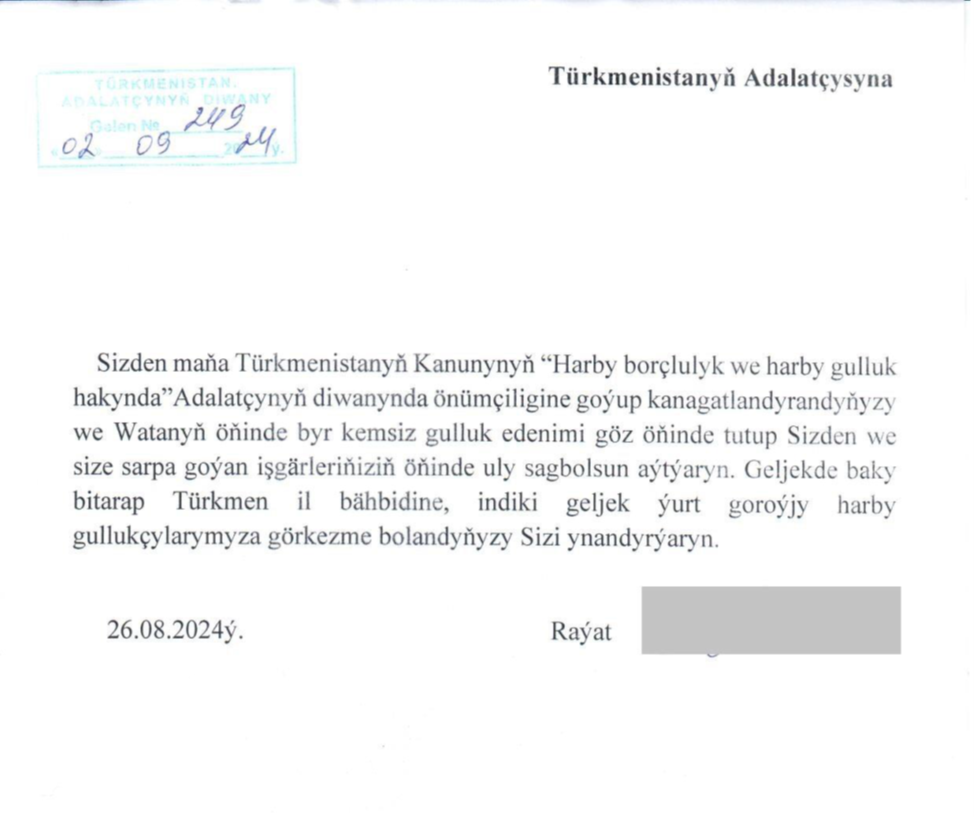
To the Ombudsman of Turkmenistan
I express my gratitude to you and the employees of your Office for satisfying my request in accordance with the Law of Turkmenistan “On Military Duty and Military Service”.
I assure you that I will try to be an example for the new generation of defenders of the country.
08.26,2024 Citizen signature
The appeal of I.I., a resident of Dashoguz region, for assistance in restoring the health of M.I.’s son, whose eyesight was severely damaged during military service, was registered with the Office of the Ombudsman and verified by the Ministry of Defense of Turkmenistan on the basis of an appeal from the Ombudsman in accordance with Article 27 of the Law of Turkmenistan “On the Ombudsman”. As a result of the work carried out, on 16 November 2024, serviceman M.I. was prematurely demobilized into the reserve on the basis of a diagnosis made by the conclusion of the Central Military Medical (Medical) Commission, as a result of an examination conducted in accordance with the Regulations on Medical Certification in the Armed Forces of Turkmenistan, approved by joint Order 277/381 adopted by the Ministry of Defense of Turkmenistan and the Ministry of Health and Medical Industry on 21 November 2017. His son was also compensated in the amount of 40,000 manats for additional examination.
Some appeals from citizens of the country express dissatisfaction with the court decisions that have entered into force in their civil cases. They asked for assistance in reviewing their complaints by way of supervision in higher courts, referring to the norms established in chapter 49 of the Code of Civil Procedure providing for the reconsideration of court decisions (decisions, rulings, resolutions) that have entered into force in the courts of the supervisory instance. Appeals of such nature, after registration with the Office of the Ombudsman, are sent by affiliation or are satisfied as a result of the work carried out by the Supreme Court on the basis of consideration of the Ombudsman’s recommendation submitted in line with Article 30 of the Law of Turkmenistan “On the Ombudsman”. Some of these requests are given in the examples below.
The appeal of a resident of Ashgabat, M.G., registered with the Office of the Ombudsman, expressed her dissatisfaction with the decision of the Bagtyyarlyk District Court of Ashgabat in a civil case on the division of a car owned by her and her husband, and the recognition of the purchase and sale agreement as invalid, and a request for assistance in reviewing this civil case in a supervisory manner and making a fair decision. Based on Article 30 of the Law of Turkmenistan “On the Ombudsman”, it was forwarded to the Supreme Court of Turkmenistan. As a result of the consideration of the Ombudsman’s proposal, a response was received on the issuance on 13 December 2024, of a ruling by a judge of the Supreme Court of Turkmenistan on the request of the relevant civil case and a comprehensive review of all the arguments expressed in the Ombudsman’s proposal.
The appeal of a resident of the Lebap region, G.T., who expressed dissatisfaction with the court rulings and expressed requests for assistance in restoring his violated rights, was registered with the Office of the Ombudsman. In accordance with paragraph 2 of the first part of Article 18 of the Law of Turkmenistan “On the Ombudsman”, relevant materials were requested and studied. As a result, at the request of the Ombudsman, G.T.’s supervisory complaint was considered on April 25, 2024 at a meeting of the Board for Civil Cases of the Supreme Court of Turkmenistan, where the decision of the Sayat district court of 7 December 2023 and the ruling of the judicial Board for Civil Cases of the Lebap Region Court of 7 February 2024 were canceled. This civil case was sent for a new judicial review in a different composition of the court to the court of the city of Turkmenabat, Lebap region, which was reported to the Office of the Ombudsman.
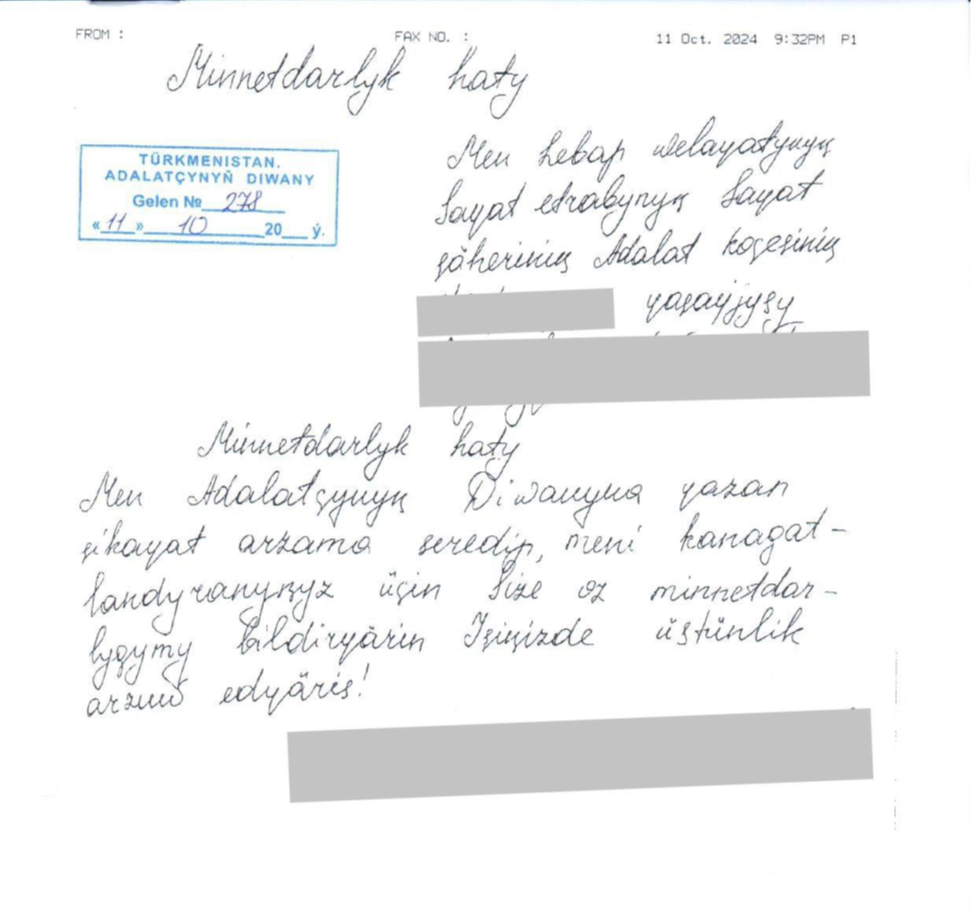
Letter of thanks
I, a resident of Adalat Street in Sayat district, Sayat, Lebap region, express my gratitude to the staff of the Ombudsman’s Office for reviewing my application and satisfying my claims. I wish you success in your work.
As pointed out before, the right of everyone to protect his or her health is guaranteed by the Constitution of Turkmenistan. During the year under review, the Ombudsman's Office received residents of the Sarahs etrap of the Ahal Velayat Sh.T. and others who submitted an oral statement on the issue of their health.
After clarifying their issue, urgent measures became imperative. As a result, based on this statement, an appeal was made to the Ministry of Health and Medical Industry of Turkmenistan stating that several private enterprises were delivering, unloading and storing granular technical sulfur in an open area at the railway station located in the Sarahs district area, Ahal region. In an appeal to the Ministry of Health and Medical Industry, a request was made for the State Service for Sanitary Epidemiology and Combating the Spread of Disease to conduct sanitary control on compliance with sanitary standards in the above actions, as well as on the degree of harm caused to public health by the spread of the smell of sulfur and sulfur dust in this locality. After receiving an official notification that the storage of sulfur in the above-mentioned quantity and form causes serious harm to human health, in accordance with Article 30 of the Law of Turkmenistan “On the Ombudsman”, the Ombudsman submitted a recommendation to the hyakimlik of Ahal region outlining the situation in the Sarahs district and taking urgent measures to eliminate the situation. As of the end of the year, work was continuing on this recommendation.
During the implementation of a business trip to Dashoguz region in 2024, in accordance with the Work Plan of the Ombudsman’s Office, the staff took part in the reception of citizens together with members of the Special Commission of the Hyakimlik of Dashoguz region to consider citizens’ appeals. A group of entrepreneurs raised the issue of disagreement with the assignment of rent to the state-owned objects leased by them. During an on-site inspection of this issue, it was revealed that the hyakimlik of Dashoguz region, the Dashoguz region Finance and Economics Department of the Ministry of Finance and Economy of Turkmenistan, the Dashoguz region Department of the State Commodity Exchange of Turkmenistan, the “Daşoguzörisuw” repair and construction company of the “Turkmenörimeýdanlarysuwlandyryş” production association and other enterprises determined the amount of rent in their orders (resolution). Whereas Article 10 of the Law of Turkmenistan “On Lease” and Part seventeen of the Procedure for Leasing State property, approved by Decree of the President of Turkmenistan No. 1452, adopted on 1 November 2019, established that “the rent per unit area or other parameter of the leased object is established by the authorized body”. The revealed contradiction to legislative norms meant the identification of actions that contradicted the requirements of the Law. As a result, the Ministry of Finance and Economy of Turkmenistan, as the authorized body in the lease of state property, based on Article 30 of the Law of Turkmenistan “On the Ombudsman”, had made a recommendation to eliminate the illegal actions outlined above. Further, taking into account that this appeal did not lead to the expected results, the Ombudsman made a proposal to the Prosecutor General of Turkmenistan to eliminate this violation. This resulted in the cancellation of the previous Order on the transfer of powers to assign rent to regional administrations; and Order No. 274-i of the Ministry of Finance and Economy of Turkmenistan of 27 December 2024 established a certain amount of rent in Turkmenistan.
In the relevant chapter of the report, it was shown that one of the key areas of the Ombudsman’s work is to promote international cooperation in the field of human rights. If there is a need to provide assistance on the territory of Turkmenistan on issues raised by authorized representatives for human rights of other countries, the Ombudsman carries out relevant work within her authority. In the year under review, 8 appeals on these issues were received from authorized representatives for human rights of foreign countries. These appeals were related to assistance in sending alimony payments paid by citizens of Turkmenistan, obtaining documents from institutions of Turkmenistan necessary for registration of a pension, citizenship issues. Relevant work has been carried out on them in accordance with the legislation of Turkmenistan and appropriate answers have been given.
Thus, in this chapter, devoted to the appeals and proposals of the Ombudsman implemented in the year under review, the work carried out is shown on the basis of the above examples. However, despite the fact that positive results have been achieved on some of the issues raised, it remains necessary to draw the attention of officials and authorized bodies to violations of laws taking place.
Chapter IX. Conclusion
In accordance with the Law of Turkmenistan “On the Ombudsman” and the Work Plan of the Ombudsman’s Office for 2024, this Report reviews and summarizes the human rights situation in the country and the activities of the Authorized Representative for Human Rights in Turkmenistan, the Ombudsman, carried out in 2024.
Chapters of the Report show the work carried out in each area, as well as the example of the work carried out, describe the situation in the country to ensure human and civil rights to a decent life, health, education, housing, work, recreation, a clean environment and other rights, describe the work carried out by the Ombudsman and set out specific recommendations.
As can be seen from the Report, the scope of the Ombudsman’s activities in 2024, called the “Fount of Wisdom of Magtymguly FRAGI”, has expanded significantly. The issues of protection of human, civil rights, and freedoms in the country were studied actively, comprehensively, widely, and unhindered. The reason for this is that the work of the Ombudsman in our democratic and rule-of-law state can be explained primarily by the creation of broad opportunities and enabling conditions by the State, along with the exercise of powers defined by law without any restrictions, because the Ombudsman’s activities complement the existing state means of protecting human and civil rights and freedoms.
While analyzing the work of the Ombudsman, it should be emphasized specifically that the observance of legislation in the field of ensuring human rights by State authorities in the country is improving year by year. It can be noted that the reason for this, first of all, is that at a new stage of the country’s development, in a new era of the Revival of a Powerful State, the large-scale reforms implemented by the President of Turkmenistan, the ongoing political, social, economic, domestic, cultural and humanitarian developments are aimed primarily at improving the well-being of citizens.
The work carried out by the Ombudsman’s Office in the past 2024 was aimed at ensuring civil, political, economic, social and cultural human and civil rights, monitoring the observance of human rights and freedoms by public authorities and officials, effective consideration of citizens’ appeals, improvement of legislation, including the Law of Turkmenistan “On the Ombudsman”, the development of international relations in human rights, raising human rights awareness and literacy, promoting the activities of public human rights associations, improving the activities of the Ombudsman’s Office.
As shown in the relevant Chapters of this Report, in 2024 the powers of the Ombudsman and the scope of her work were broader. First, based on the decree of the President of Turkmenistan of 14 June 2024 “On Improving the Activities of the Ombudsman’s Office”, the structure of the Ombudsman’s Office was optimized, new units were created, and the number of employees was increased. In particular, through improving one unit in the Office of the Ombudsman, two additional units were created, the Unit for the Protection of Women’s and Children’s Rights and the Unit for the Protection of Human Rights in the Private Sector.
With the adoption of the Law of Turkmenistan “On Amendments and Additions to Certain Legislative Acts” on 30 November 2024, provisions were added to the Law of Turkmenistan “On the Ombudsman” that expanded the duties of the Ombudsman and improved his/her work. The powers of the Ombudsman have been added to monitor the observance of guarantees of human rights and freedoms not only by State authorities, local governments and their officials, but also by enterprises, institutions, organizations and other persons, regardless of the form of ownership. The powers of the Ombudsman to make recommendations on the immediate restoration of violated human and civil rights and freedoms to enterprises, institutions, organizations, officials and other authorized persons who violated human and civil rights and freedoms have also been expanded, along with provisions on the possibility of the Ombudsman making proposals that prevent circumstances that may lead to violations of civil and human rights and freedoms.
This indicates that the work of the Ombudsman and her Staff in protecting human rights and ensuring human rights in the country is supported and highly appreciated by the State.
The work carried out in the year under review in cooperation with the UN OHCHR, the UNDP, and the APF on the Accreditation of the Ombudsman’s Office in the GANHRI is worth of attention. As a result of this activity, on 16 October 2024, the Office of the Ombudsman of Turkmenistan was assigned the legal category “B”. By assigning this category, it was confirmed that the work of the Office of the Ombudsman of Turkmenistan for the protection of human rights in the country complies with international standards. With the expansion of the work of the Ombudsman and her Staff based on the law and international accreditation, more responsible and active actions are anticipated in the coming years.
The relevant Chapters of the Report also described the activities of the Ombudsman over the past 2024 in such areas as promoting the development of international relations on human rights, improving national human rights legislation, and promoting awareness and outreach. Each chapter of the Report is concluded by the Ombudsman’s recommendations on improving work in relevant areas, strengthening oversight and preventing human rights violations. Based on these recommendations, the Office hopes that government agencies and officials will take a more responsible approach within their competence to the observance of human rights.
In accordance with the Law of Turkmenistan “On the Ombudsman”, The Ombudsman’s Office expresses its great appreciation to the Government of Turkmenistan for the support and conditions created for the Ombudsman to fully perform her duties, as well as expand and improve the work of the Ombudsman's Office in accordance with international standards.
We assure you that, within the limits of her powers, the Ombudsman, together with the close-knit Staff of the Office, will promote the observance of human, civil rights, and freedoms in the country.
